CSR in Sport


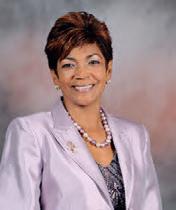

T&T CSR REVIEW 2016 3 Editorial 5 CSR Stories Shell Trinidad and the STEM Initiative Interdisciplinary and applied learning 6 bpTT’s Impact on Tertiary Level Education Tracer study measures social returns on investments 10 The Energy Chamber of Trinidad and Tobago A pioneer in CSR initiatives 14 The Power of the Spoken Word First Citizens’ artistes are revolutionising creative expression among T&T youth 16 The Run for Food How Massy Stores’ CSR Food Initiative is helping local farmers 20 Nestlé and the Dairy Industry Creating shared value with local farmers 24 NGC Higher, Faster, Stronger - Collaborating with communities in sport 28 RBC Leads the Way Diversity and Inclusion is good for economic growth 32 Contents Harmony as a Fundamental Principle SCG’s CSR aims to better lives in T&T 37 A Powerhouse for Cricket Professionals How Powergen’s investment in sport is paying dividends 40 CSR & Sports How the Young Prince built his brand More than sporting success 44 Sporting Interventions A tripartite approach to stemming violence in society 46 Conscious CEO Catherine Kumar Business and the CSR Evolution 50
The Trinidad and Tobago Corporate Social Responsibility Review features the unique social programmes and experiences of companies from a wide range of sectors including Energy, Finance, Manufacturing, Communication Services, Retail and others as they strengthen communities and transform lives across Trinidad and Tobago.
www.virtual-tt.com
Editor-in-Chief
Donna P. Ramsammy
Deputy Editor
Wendy Singh
Contributing Editor Linda Hutchinson-Jafar
Art Director Kathryn Duncan
Advertising
Virtually Yours T&T (VYTT)
Production Coordinator
Valery Marin
Publisher VYTT
Photography Andre Neufville (where credited)

Photos for CSR stories supplied by the featured company Shutterstock.com
Printers
Office Authority Ltd., Trinidad and Tobago
Contributing Writers
Robert Clarke . Pat Ganase . Michelle Rahaman . Donna Ramsammy . Wendy Singh
Publisher:
Virtually Yours T&T Ltd; Francis Lau Street, Woodbrook, POS
Phone/Fax 1.868.622.2663
Email: team@virtual-tt.com
CSR Lessons
Reptrack’s 2016 Analysis puts Google, Disney and Rolex at the Top of the Reputation Index
52
56
COVER: CSR in Sport

Justice Delayed and BusinessWhy a failed justice system costs businesses
54 Mercy and the LawA judicial system in gridlock
60
I could have been a shooter His Grace, Archibishop Harris speaks out on crime and social justice 58 Directory
Donna P. Ramsammy Editor-in-Chief

This year’s TTCSR edition has been published just ahead of the 2016 Rio Olympics and we are pleased to have a section specially dedicated to sport. An interview with TT Olympic Committee President Brian Lewis provides some context on how corporate Trinidad and Tobago is investing in professional sport and supporting a number of star athletes for the Game.
Blink|Bmobile has launched its ‘Bring it Home’ campaign which inspires hope for gold in a number of disciplines including athletics, cycling, and swimming. Jehue Gordon also features as a brand and not just a sportsman.
On a more sombre note, the issue of crime and lawlessness in society continues to occupy the attention of a number of corporate entities and institutions,
including the Catholic Church. The Roman Catholic Archbishop of Port of Spain, His Grace, Archbishop Joseph Harris, has launched a national appeal to free prisoners in Remand Yard who have been waiting for an extraordinary amount of time to have their cases heard. Unfortunately, the appeal has met with resistance in some quarters and has sparked a debate among other religious groups who are opposed to the idea. The Review interviewed the Archbishop to get his perspective on his Mercy Appeal and on his timing. Attorney Gregory Delzin and Human Rights Consultant Wendy Singh also weigh in on the debate and their views are carried in this edition. Our Conscious CEO this year is Catherine Kumar, who comments on the economic slowdown and how responsible businesses should be responding. She also reflects on the principles of social responsibility and its role in the practice of sound corporate governance.
My own opinion is that in a slow economy, everyone should share the burden. Over the last three decades, corporations have recorded the highest profit margins in history. But maximising profits has come at a great cost to consumers, employees and even developing markets like ours that rely on big business to boost employment numbers and to pay taxes. The unusual alacrity with which some companies responded to emerging discussions on a national ‘economic downturn’ by closing operations or sending employees home, should be cause for concern. It means that the people who have helped these companies to amass great wealth, will be disenfranchised over what many see as a necessary rebalancing of business and civil society. Knee-jerk solutions such as workforce contraction and reductions
in capital expenditure may appear to ‘maximise profit’ in the short-term but is it real profit?
Could it be then, that companies should reset their expectations on profitability to be more in line with global realities? Could it be that the time has come for business to share the burden? While many CEO’s are earning millions for showing quarterly bottom-line increases, many of their workers are under-paid, under-employed, in debt or more recently, simply out of work.
I certainly am no economist, nor will I pretend to make an academic analysis of the effects of the increasing number of persons joining the breadline; but it seems reasonable to surmise that if there are less people able to buy food and clothes, or pay for products and services, or able to take loans or mortgages, then there will be less revenue available to many other companies.
Perhaps companies should be resetting priorities to aim for a more equitable distribution of wealth – not just for executives and shareholders, but for all stakeholders, including their workers, consumers and the communities in which they operate.
The Review commends those companies that have seen the value of maintaining their investments in social programmes and that have made the critical adjustments to retain employees during this current challenge.
Donna Ramsammy Editor-in-Chief
T&T CSR REVIEW 2016 5
Editorial
Shell Trinidad and the STEM Initiative Interdisciplinary and applied learning


It’s difficult to contemplate that in a country where there are some 18,000 students registered at the St. Augustine campus each year, that we will have a shortage of skills in key traditional disciplines. In March of 2016, Minister of Education, the Hon. Anthony Garcia, announced in a post-cabinet briefing that since its introduction in 2004, over 190,000 persons have benefitted from the Government Assisted Tertiary Education (GATE) programme at a cost of $5.5 billion. In 2016, according to the Minister, $650 million has been allocated to GATE.
The challenge faced by GATE is whether or not the investments in education are being properly aligned to economic development.
Education and Skills Misalignment
Leslie Bowrin is Head of Social Performance at Shell Trinidad (formerly BGTT) and has led that portfolio since 2008. He doesn’t have to look far to affirm this apparent misalignment. In his own company, like many of the other energy operators, there exists a paucity of engineers in specific disciplines such as well-engineering, process safety, electrical and instrumentation engineering among others.
This growing disaffection for studies in the sciences is not peculiar to Trinidad and Tobago. It is a global issue that many corporations are paying attention to, since it presents a real risk to business continuity over the medium to long term. Trinidad and Tobago drastically needs to enhance its critical thinking and problem
solving skills. Bowrin believes that here at home, it is essential that the government sets criteria for eligibility of programmes and institutions to be more in tandem with business needs and realistic job opportunities for new graduates.
Fixing the problem is not an easy task, but a global project aimed at addressing the gaps was first launched by BG Group in 2011; and Shell Trinidad is a part of the initiative which aims to build renewed interest in the areas of Science Technology, Engineering and Mathematics (STEM), along the education value chain. The interventions aim to refocus the curriculum and academic interest in creating a cadre of youth who will be able to satisfy the technical competencies needed in a number of institutions and firms who rely on scientific knowledge application to stay competitive and in business.
What is STEM?
So what exactly is the STEM initiative? STEM is a curriculum based on the idea of educating students in four specific disciplines — science, technology, engineering and mathematics — in an interdisciplinary and applied approach. So, rather than teach the four disciplines as separate and discrete subjects, STEM integrates them into a cohesive learning paradigm based on real-world applications. This blended approach to study is what distinguishes the programme and what facilitates the different kind of learning and practical approach to education.
According to Teach for America (TFA), some eight million STEM jobs will become available in 2018 but there will be no one to fill these vacancies because of the lack of graduates. TFA and the Amgen Foundation launched the STEM initiative in 2004.
6 T&T CSR REVIEW 2016 CSR Story
Engaged and enthusiastic
Recent research by the U.S. Department of Education, shows that “only 16 percent of high school students are interested in a STEM career and have a proven proficiency in mathematics.”
In the United Kingdom, there is a predicted shortfall to adequately fill vacancies in about 100,000 STEM jobs. In Germany, it is estimated at about 210,000. Comparatively, the peer country with the greatest proportion of STEM graduates, Finland, has over 30% of their university graduates coming from science, mathematics, computer science, and engineering programmes.
STEM academic disciplines include : physics, actuarial science, chemistry, biology, mathematics, applied mathematics, statistics, computer science, computational science, psychology, biochemistry, robotics, computer engineering, electrical engineering, electronics, mechanical engineering, industrial engineering, information science, civil engineering, aerospace engineering, chemical engineering, astrophysics, astronomy, optics, nanotechnology, nuclear physics, mathematical biology, operations research, neurobiology, biomechanics, bioinformatics, acoustical engineering, geographic information systems, atmospheric sciences, educational/ instructional technology, software engineering, and educational research.
The STEM initiative aims to cultivate an interest in the natural and social sciences immediately upon entry into the school system for primary or preschool students.
Early engagement is seen to promote increased interest and success in STEM subjects in high school and increased enrolment into these disciplines at universities.
Shell Trinidad invests in STEM


Leslie Bowrin explains that his company’s interest (then BG Group), began in 2011 and was driven by a collective concern within the energy sector in assessing its skills demands and the supply variance in the local labour market. Based on global needs, the only market mass producing these skills, was India. By investing in STEM education, the company aims to:
• Deliver enduring and wider socioeconomic benefits;
• Contribute to government priorities for employment and economic development; and
• Develop the long-term skills needed for the energy industry.
Shell Trinidad’s interventions within the schools is to build awareness, create excitement and more importantly, to inspire teaching interests to produce a cadre of scientists who are educated in an integrated science environment. In a pilot launched in 2014, Shell set out four clear objectives. These are to:
• Build teacher capability in STEM related subjects;
• Support young people to develop their confidence and self-belief in STEM subjects;
• Enhance interest and performance in STEM subjects at secondary school;
• Build awareness of careers in the oil and gas sector.
Bowrin explains, “This approach is structured to engage problem solving skills, critical thinking and innovation.” While he sees the benefits to the energy sector, he believes that “the manufacturing, agriculture and service sectors all need an injection of critical thinking to resuscitate and become competitive.”
In a bold initiative with the University of the West Indies School of Education, Shell embarked on a pilot programme to train teachers to deliver STEM education using concepts and principles of integrated learning and teaching techniques. The strategy in this, says Bowrin, is to “focus on the schools that are under-represented as graduates in the disciplines but to provide a mix with those who are more success-ready.”

T&T CSR REVIEW 2016 7
Practical Drone Operation
STEM Workshop Technical Study of the Drone
Shell contracted project management and research firm Sacoda Serv to assess the pilot, inclusive of its impact in the schools and the programme’s design in order to use those findings to implement a national programme. With the approval and support of the Chief Education Officer, under the Schools’ Supervisors for Victoria District and Port of Spain, they have invested in the upgrade of labs of the two schools identified at the start of the project. The company has also struck a number of critical partnerships to ensure that the programme lands right and that the learnings can be utilised to expand the programme to other schools. In this regard, two key partners are the National Institute for Higher Education and Research in Science and Technology (NIHERST) and the UWI Arthur Lok-Jack Graduate School of Business (ALJGSB).
Sacoda’s role is to facilitate the following:-
• Rapid assessment of the impact of the first pilot programme, implemented by the School of Education UWI, on utilisation of knowledge and skills gained during the training programme;
• Development of a Science/Math teacher training programme that is geared towards continuous professional development (UWI, UTT and Master Teacher programme);
• A Student Support programme that would garner interest for STEM education and STEM careers- both at the professional and technical levels;
• A Science Award Competition and Exhibition;
• Development of a Technology, Innovation and Communication Plan to Embed a STEM Culture in the school aged population; and
• Performance Management for the STEM Programme
Shell has also partnered with NIHERST to socialise science through personal experience. The NIHERST’s Eureka camps cater for students in the 10-12 age group who have an interest in science, challenging the students to explore
careers in scientific fields, conduct labs and field work in addition to free time activities.
In response to Shell’s needs to build capability in some of the important areas needed for STEM delivery, the UWI-ALJGBS has developed a three-day programme called a ‘Strength in YOU-th Programme, which is a highly interactive youth development programme that encompasses leadership simulation games and exercises designed to enable participants to identify their own particular leadership strengths. In addition, the School of Business has also launched a two-day programme, ‘Critical Thinking and Creative Problem Solving Skills for Youth’ which looks at a wide range of situations, from identifying and correcting problems in academic work, to solving the problems of everyday life.
In 2013 the company engaged in a nation-wide collaboration with teachers, curriculum officers and Heads of Districts to identify gaps in the delivery of STEM subjects. That information has been used in the development of the current teachers training programme.
Bowrin is aware that the success of the programme will rely heavily on teachers giving extra time and effort outside of the standard curriculum requirements to ensure STEM compliance. But he also anticipates that success will encourage other schools and have a much needed ripple effect in boosting interest and passion in the STEM subjects. He believes
that STEM in schools in Trinidad is a direct response to the corporate voice in the country calling for education delivery to be more responsive to economic drivers.
“Business,” he says, “should also advocate for teachers to be better compensated and to have the right teaching tools at their disposal to be effective.”
Bowrin believes that the current situation analysis, which was conducted by Sacoda, is pointing the way for how the STEM approach can be applied across primary and secondary schools nationally. What’s needed he says, is “An Explicit STEM Agenda (to strengthen STEM education in school and expand the STEM human resource pool); An Enabling Environment for STEM and STEM education; Labour Market Alignment (based on sound labour market data); and better Benchmarking and Research.” Shell’s future plans include a national consultation and the employment of STEM ambassadors.
Current Shell’s STEM Partner Institutions:
• Faculty of Engineering and the Engineering Institute of the University of the West Indies;
• Geomatics Department of the University of the West Indies;
• Arthur Lok Jack Graduate School of Business;
• National Institute of Higher Learning, Research Science and Technology (NIHERST);
• KENSON School of Production and Technology Ltd;
• Metal Industries Company Ltd (MIC);
• Trinidad and Tobago Civil Aviation Authority;
• Trinidad and Tobago Air Support Company;
• Royalink Ltd (ICT and Mentorship);
• Mathematics Support Group;
• Anthony Petite-IT Programmer and Anti Cyber Bullying Activist;
• UTT Marine Campus at Chaguaramas;
• Water and Sewerage Authority (WASA);
• The Zoological Society of Trinidad and Tobago (The Petting Zoo);
• Creative Thinking Programme (Internal Support Team); and
• Drive Wise (Trinidad) Limited.

8 T&T CSR REVIEW 2016
The Human Knot
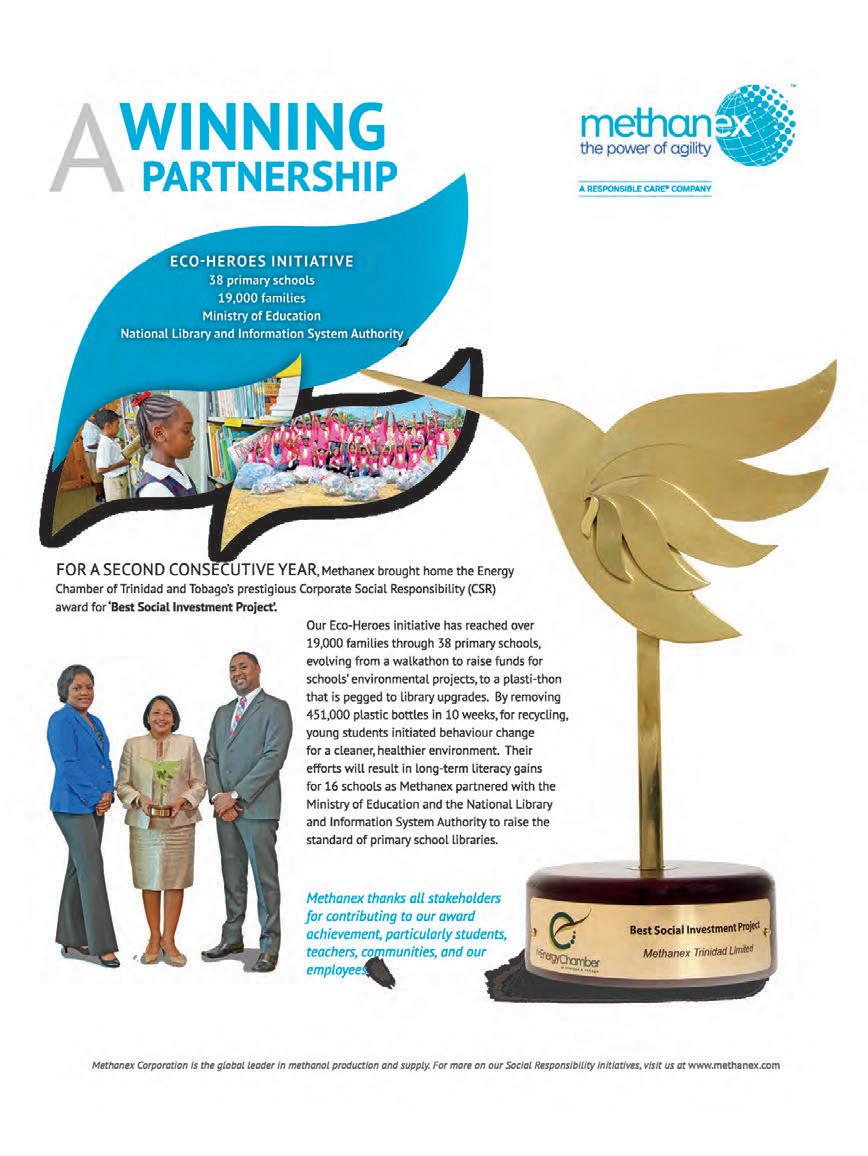
bpTT’s Impact on Tertiary Level Education in Mayaro Tracer Study measures social returns on investments
Changing social attitudes dictate that businesses can no longer act as insular economic entities removed from the reality of the societies within which they operate. Stakeholders are demanding that businesses function in a socially responsible manner and corporate social responsibility agendas are now integral to company strategy. This change from ‘business as usual’ has also meant that companies must consistently measure and regularly report on their social performance. Social performance data, now included in many sustainability reports, is crucial to company competitiveness and profitability. In this article bpTT will seek to give an account of its social performance on one of its programmes to its stakeholders.
(Rachael Caines, CR Advisor, bpTT)

Globally, companies are seeking to respond to changing social attitudes by disseminating rigorous data about their social performance. As stakeholders become more informed and knowledgeable and employees more ethically engaged, companies are responding by measuring and discussing their corporate social performance with their stakeholders. This article is one of the ways that bpTT ‘seeks to give account of its social performance to its stakeholders.’
In addressing the emerging and complex nature and challenges in 21st century
Trinidad and Tobago, higher education stands out as one of the major keys to coping with structural reforms. Through its essential functions, higher education makes-up a vital and strategic part in development. Following the national initiative to raise enrolment in tertiary level education to double digits – in 1996, UN statistics indicated that just 7% of the population had university level qualifications. Consequently, as part of its Corporate Responsibility Agenda, bpTT launched and supported several successive tertiary level initiatives Included in these are:-
• an active Geoscience Programme at the University of the West Indies,
• support for Post Graduate Scholarships at the University of Trinidad and Tobago,
• partnership with the United States Embassy towards the Fulbright programme,
• the British High Commission Chevening Scholarship programme and most importantly,
• a fit for purpose scholarship programme “Brighter Prospects” specifically for residents of the community in which bpTT has its major operations – Mayaro.
One of the most important concerns of Corporate Responsibility may be the empowerment of its stakeholders. It is about active commitment to making a difference in one’s community, society and country. Companies make a difference in a variety of ways but as bpTT pursues its initiatives emphasis must be placed on testing the results of
its investments to pave the way for more effective interventions. To this end bpTT commissioned a Tracer Study in 2015 which was undertaken by independent consultant, Andrew Cross, with the ultimate aim of examining the benefits and challenges of its investment. The results paint a picture of success for tertiary level growth in Trinidad and Tobago but more importantly for tertiary level growth in the community of Mayaro – a community, which according to national statistics was experiencing less than a 2% tertiary level attainment in 2001. While the study attempts to uncover some broad statistics at the national level, the ultimate aim is to focus on those objectives and results that were realised in the Mayaro community through the Brighter Prospects programme.
Analysis of the respondents indicated distribution in scholarship programmes as follows:
• approximately 65% of the sample were recipients of Brighter Prospects scholarships;
• 18% received open bursaries to the UWI;
• 14% received Chevening scholarships; and 3% received Fulbright scholarships.
• The completed results from the geoscience programme were not yet available at the time of this publication
Objectives of the Tracer Study
The Tracer Study was designed to clarify BPTT’s relationship with, and contribution to, the community with which it has been most closely associated.
10 T&T CSR REVIEW 2016 CSR Story
The results of the study were expected to clarify, among other things:
• The social return on BPTT’s investment;
• Understanding the participants: the extent to which students are successfully completing their courses of study and the rate of drop out with attendant reasons; whether graduates are able to find work in professions that match their qualifications or training
• The adequacy of the employment: how many remain unemployed, temporary, underemployed, selfemployed or permanent; and the level of remuneration afforded by tertiary level qualifications;
• The extent to which the Geosciences Programme has provided direct talent to BPTT and/or the wider energy sector

• Whether Brighter Prospects graduates have remained resident in their communities and are active in NGOs/CBOs; whether they have pursued higher degrees and remain resident in Trinidad and Tobago.
Student profile
The data revealed that a majority of the students (75%) were female which is consistent with the global disparities of tertiary level attainment. A majority of the respondents i.e. 60% were in the most productive age group between 25 and 35 years. A number of students identified themselves by ethnic grouping:
Afro-Trinidadian (46%); mixed (29%); Indo-Trinidadian (19%).
It is noteworthy that of the Brighter Prospects candidates 96% completed their chosen course of study. The academic pursuits of students in the Brighter Prospect programme were not limited to the oil and gas industry; instead students were encouraged to apply for any course of study which would allow them to compete with any student nationwide. To this end, students would have enrolled at various institutions throughout the country with the largest amount, 29%, pursuing
degree programmes at the University of the West Indies, followed by 13% at the University of Trinidad and Tobago, 10% attended Metal Industries Company Ltd, 7% at Ciprani Labour College, 6% at the College of Science and Technology and under 2% at the Trinidad and Tobago Tourism and Hotel Institute.
In the 13-year period of this review, by 2009 only 30% of students had completed their course of study. However with more aggressive promotion of the programme and interventions to keep the students in school 60% of the respondents reported having completed their studies between 2010 to 2014. Moreover, apart from completing their studies 32% of respondents has over that period pursued and or completed additional studies since graduating. Of these students 32% are pursuing PhD studies.
Access to employment
Many students find it difficult to obtain work after graduation. Over half of the sample was in paid employment before graduating from their courses. At graduation, 51% responded as employed, and 42% unemployed. Most of the employed had secured jobs in the private sector. About a quarter of respondents found jobs in the public sector. A small number of persons (less than 2% of respondents) was pursuing
self-employment options. However at the time of the survey more than 70% of respondents were already employed. Of those unemployed, most were jobhunting and a few remained in full time study.
These figures indicate that most respondents found employment between graduation and their responding to the survey. Approximately 7% was unemployed for less than six months, 3% were unemployed for 6 to 11 months and, less than 2% was unemployed for over two years. Most of the respondents (57%) obtained a first job within 12 months of completing their studies.
Half of respondents are employed in entry-level positions in their various fields of employment. Approximately 17% of respondents were in management positions; 12% in middle management and 4% were managers. The majority of graduates were earning an average of $9,000 per month.
Most students (57%) were successful in finding jobs that matched their qualifications and at the time of the survey were stably employed with their current employer for more than two years. Approximately 35% was employed for over two years, and 18% reported being employed for over five years.
T&T CSR REVIEW 2016 11
Ronda Francis, Manager Corporate Responsibility at bpTT presents an award to a Brighter Prospects graduate.
Students’ views on benefits from Brighter Prospects
The respondents confidently felt that most beneficiaries returned to their communities. Respondents reported that the financial support from bpTT enabled recipients to pay fees, obtain accommodation, purchase textbooks and equipment needed for their field of studies. This contributed to reduced stress in their families and allowed students to complete their studies with a sense of security. The financial support which facilitated students to obtain tertiary level education and graduating students to assist their parents to improve their standards of living.
Personal and professional development was a significant benefit for some graduates. Nineteen respondents indicated that the BPTT scholarship assisted them in pursuing post-graduate studies. The funding facilitated access to educational opportunities that appeared unobtainable for most participants. It was also felt that the successful completion of studies also contributed to enhanced self-esteem and positive role models in the community.
Most students felt that it was imperative for the programme to continue and in fact be expanded in their community. Students reported that bpTT should bring more visibility to the proramme and that bpTT should be more involved in their progress after they have completed
their course of study. Some suggested internships in the company and assistance with job seeking. Students felt that it was important for them to “give back” to their community through volunteerism and developing ways to assist the wider Trinidad and Tobago in sustainable endeavours such as the development of renewable energy. An important aspect that students felt could improve the programme significantly is targeting, as students believed that the programme has not reached the “poorest of the poor.”

A Mayaro legacy
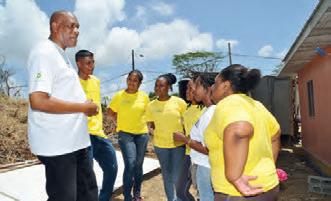
Tessila Manoe graduated in 2015 from the Institute of International Relations at the University of the West Indies in St. Augustine. With a Masters degree in Global Studies, she dreams of being a diplomat. Her long-term goal however is to build a business in Mayaro with international appeal, and to market to the world.

Growing up in Ortoire, Tessila was the youngest of four, two brothers and a sister. Her mother, retired now, was in catering and maintenance. Her father is still a casual contractor on the rigs that dot the horizon off the Mayaro coastline. In primary school, Ortoire RC, Tessila started Spanish, the language that she still loves. It was the base of CXC (Rio Claro High School) and CAPE (North Eastern College) along with History and Geography. Her BA (UWI) was a major in Spanish and minor in International Relations.
At work in the office of the MP for Mayaro, Rushton Paray, Tessila meets and assists people with their business ideas, helping to format them into practical proposals. It is an environment that is helping her to refine her own business path. Her plan, she says, is “to build experience, gather collateral for the many ideas” that flow through her mind. She will remain in Mayaro because her business idea is unique to Mayaro, and will generate employment and provide long-term benefit.
“There’s not enough local business development in Mayaro, even though a lot of residents do remain in the area. We need to draw on our own experience combined with better education, and go after our own ideas. We’ve always had agriculture, fishing – my brothers are fishermen – but we are also a tourism destination, with rivers and coastline, nature trails. Yes, it is good that education is available to more of us. We have many women who are university graduates, who are moving to careers.”
This does not mean that Tessila is turning her back on traditional women’s roles. “I would love to have children one day. It should be possible to have a business and a home and children.” Tessila is an active netballer, playing with a Mayaro team, Marvellites. She’s also a member of the UWI St. Augustine ladies’ team.
12 T&T CSR REVIEW 2016
Joel Primus, Community Sustainability and Stakeholder Relations Advisor at bpTT presents a cheque to a Brighter Prospects scholar
Tessila Manoe Matthew Pierre, Community Liaison at bpTT, speaks with Brighter Prospects scholars as they prepare to undertake a volunteer activity in Mayaro.




Over 20 years experience in international media relations and content generation. CARIBBEAN AGENCY Expert PR provides you with effective target marketing, accurate media placement and creates a positive image for your company, resulting in expanded business opportunities. #268 Harold Fraser Crescent, Valsayn, Trinidad | (868) 645-0368/(868) 686-9797 | hutchlin@gmail.com | caribbean-pr-agency.com
The Energy Chamber of Trinidad and Tobago
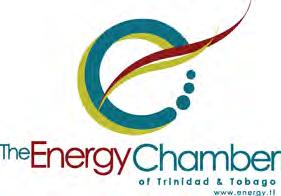
A pioneer in CSR initiatives
As part of the Energy Chamber’s strategic thrust, promoting Corporate Social Responsibility (CSR), energy efficiency and energy services continue to be main areas on our advocacy agenda. We encourage good governance practices and strategic social investment for more resilient and competitive business organisations, people and communities. The Energy Chamber has committed to promoting and developing the energy services sector – one of the most dynamic, highly skilled and internationally competitive sectors in Trinidad and Tobago (T&T).
The Energy Chamber celebrated its 60th Anniversary in March 2016. Formerly the South Chamber of Industry and Commerce, the Energy Chamber’s focus over the last 60 years has been on development and fostering positive changes at a national level. This focus involves encouraging our member companies to get involved in social responsibility initiatives.
CSR Initiatives
In 2007 the Energy Chamber in collaboration with the United Nations Development Programme (UNDP) published a detailed report into the CSR programmes in T&T. The CSR Mapping Report highlighted the fact that wellstructured CSR programmes were only being implemented by relatively few large multinationals without any coordination among companies. This led to the saturation of certain issues and a focus on a particular geographical area while other issues and areas received comparatively less attention.
Annual Awards
Based on the report, the Chamber launched its CSR Leadership Awards in 2008 aimed at recognising and celebrating companies engaged in good CSR practice, while sharing lessons amongst the membership. There were four (4) award categories and the judging criteria were based on the results and gaps highlighted in the 2007 CSR Mapping Project. It was designed to move companies forward at a national level and not just at an individual company level.
Member companies participated in categories which emphasised CSR activities in the areas of internal CSR practice, environmental stability, corporate governance, CSR in business development and CSR activities by small and medium enterprises (SMEs) that promoted business sustainability.
In 2009 two (2) new award categories were introduced: -strengthening communities through social investment, and recognising the commitment to local business development. Again in 2012, the Energy Chamber introduced two additional award categories recognising the success and contribution of member companies in exporting energy services –
(i) New Energy Service Exporter of the year and (ii) Energy Service Exporter of the year.
Over the years, this award programme has: evolved to include new categories for energy services, focused on strategies to increase participation from the small and medium enterprises, opened up to non-members, and became branded as the Energy Chamber’s Annual Awards. 2015 was no different as the awards programme saw the introduction of a

14 T&T CSR REVIEW 2016
CSR Story
Annual Award winners 2013
new CSR category – the NGO Award for Good Governance. This category was introduced based on the many requests received for corporate governance training from NGOs and civil society organisations and their attendance at our corporate governance workshops. The Energy Chamber’s Annual Awards is held in conjunction with the Trinidad and Tobago Energy Conference, as one of its main events.

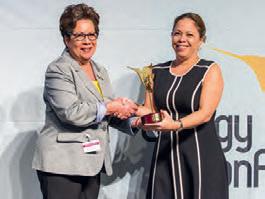

Volunteerism
One of our key objectives has been to show smaller member companies how CSR programmes can be implemented without a big budget. To this end we placed a strong emphasis on volunteerism and worked alongside the Heroes’ Foundation on this issue. Since
2010, we have taken a leading role in the Ocean Conservancy’s International Coastal clean-up (ICC) as part of the global initiative to clean up beaches and collect data on marine pollution. We received overwhelming support for this initiative from our members, NGOs, schools and community groups.

CSR Initiatives

Our very active CSR committee places emphasis not just on external social investment programmes but also on the ethics and business practices of member companies. Particular emphasis was therefore placed on improving corporate governance among our member companies, and nationally. With support and funding from the IADB multilateral investment fund, we were able to hire a
strong consulting team who developed a series of extremely useful tools including an online tutorials and a self- assessment tool. These tools were extensively used throughout a series of workshops aimed at private and public organisations and NGOs. These tools are available on the Energy Chamber’s website and we continue to provide training and support to organisations on corporate governance.
The Energy Chamber remains committed to CSR initiatives both internal and external and continues to advocate among our membership and at a national level to foster volunteerism, promote sustainability and reduce our overall impact on the environment.

T&T CSR REVIEW 2016 15
2016 Annual Award winners: (l. - r.): Methanex, Life Centre, TOSL Ltd.
Beach Cleanup - Carli Bay, Couva 2016
Corporate Governance Workshop
Corporate Governance Project deliverables Launch 2014
The Power of the Spoken Word
How First Citizens’ artistes are revolutionizing creative expression among T&T youth


First Citizens is involved not just in this particular art-form but in artistic, expression in word and music among the nation’s youth.
For a culture that is so steeped in the oral tradition, the evolution of ‘Spoken Word’ and the speed at which it is gaining ground as a preferred form of creative expression among youth, has come as no surprise to the arts community. But for many of us across Trinidad and Tobago, we are still playing catch up with this unique art form that has found a voice among Caribbean youth.
So what exactly is Spoken Word? It is a form of expression that can include storytelling, poetry and monologues and is determined to be a tradition in African culture of storytelling and folklore, such as “Br’er Anansi”. Its rise in the African American creative industry was first through rap music before establishing its own independent space. Here in the Caribbean, calypso is reflective of the same African tradition of storytelling. Where rap and calypso have converged as performance poetry, is in the Spoken Wordnot just as social commentary, but more in terms of social protest.
If we think of the late Muhammad Ali, we think of him not just as a man of rhythm in the boxing ring, but a man of rhyme – a Spoken Word artist. He has been fondly described as a major proponent of Spoken Word poetry, often expressing his thoughts in rhyme, cleverly taunting his opponents with poetic couplets. According to writer
Katy Waldman, “Boxing and talking were Ali’s one-two punch.” About six months before his career skyrocketed with a world championship title—and before he converted to Islam and dropped his “slave name” Cassius Clay –many will remember that he released an album of Spoken Word poetry titled “I Am the Greatest”.
Ali provides a highly visible reference point for us in what the Spoken Word can achieve in terms of challenging the status quo and breaking boundaries. Communications Officer at First Citizens Financial Group, Evelena Bruce is passionate about Spoken Word and shared with us how her organisation is involved not just in this particular
art-form but in artistic expression in word and music among the nation’s youth. This includes calypso as well. As she explains, “Through our youth development projects we align ourselves with the United Nation’s global youth development initiatives which seek to empower youth to become “agents of social change and peace; and with Trinidad and Tobago’s National Youth Policy which aims to ensure ‘For every youth a place, a purpose, a plan’, and that’s our aim”. Within this context, Bruce says, First Citizens strives to “To inspire, encourage and empower youth to find their voice”.
The First Citizens National Poetry Slam 2016 marks the fourth year that First Citizens is involved in the National Poetry Slam which it hosts in partnership with the Bocas Lit Fest. According to Bruce, “the festival works to promote literacy and to celebrate and develop regional and international books, writers and writings. The First Citizens National Poetry Slam closes the festival and is quickly becoming the most popular festival event. It is managed by ‘The 2cents Movement’, a non-governmental organisation, dedicated to “creating consciousness” and run by a group of young adults and founder, 26-year old Jean-Claude Cournand, himself a former performance poet.”
The 2013 Spoken Word artist Crystal Skeete had delivered a mesmerising spiel on ‘maxi-men’. She has since added video to her poetry which resulted in her work gaining momentum on YouTube - and
16 T&T CSR REVIEW 2016
CSR Story
Performing at the First Citizens TUCO Junior Calypso Roving Tent 2016 on the Brian Lara Promenade
with that, a number of new converts to the T&T poetic fraternity. Bruce reflects that while youth interest in calypso may be waning, that Spoken Word is probably “picking up where calypso left off”, drawing an increasing number of creative writers to centre-stage. Thematically, the Poetry Slam addresses critical social issues like crime and violence, sexual abuse, politics and corruption. However many humorous and off-beat entries also make it to the finals.
Commenting at the Spoken Word semifinals this year, First Citizen’s Deputy CEO - Business Generation, Jason Julien commented, “The quality, creativity and energy demonstrated in the semis are testament to the rich level of talent resident here and I am looking forward to seeing these masterpieces on full display at the upcoming finals.”
At the finals, Seth Sylvester emerged as the 2016 First Citizens National Poetry Slam Champion and winner of the top prize of $20,000. Sylvester is a powerful phenomenon both on-stage and offstage. In a passionate ode to TV news anchor Desha Rambajhan, he was on fire, stealing the hearts of both audience and the judges.
In second place, Kyle Hernandez delivered a piece about underachieving men in society and a lack of ambition which is fondly referred to as “Big Man Ting”. 2014 winner Idrees Saleem’s “Poetic Justice League” took him to third place. Last year’s winner Derron Sandy was burning up with issues he wants to see addressed in society – and his inflammatory comments on politicians are potently captured in his narrative on ‘Breadline’. Unfortunately, he didn’t make it to the top three.

Bocas Lit Fest organisers have had over 140 Spoken Word artists of all ages audition this year for the Poetry Slam. Thirty-three semi-finalists competed for a spot in the Finals. While the semi-final rounds were judged by a select panel of local poets, the final was judged by a

panel of internationally renowned, prizewinning poets who are also participants in the annual NGC Bocas Lit Fest.
First Citizens is also title sponsor of the annual national TUCO Junior Calypso Monarch which celebrated its 40th anniversary this year. The competition attracts a large cross-section of youngsters from both Trinidad and Tobago. Coupled with its sponsorship of the Junior Calypso Roving Tent annually which features the finalists of the previous TUCO season, student cantors get the opportunity to tour and entertain primary and secondary schools across the nation. According to Bruce, “It is another positive outlet for self-expression that over the past few years has produced thought provoking and socially conscious messages on par with those performed

by many adult calypsonians. This is a testament to the youth’s awareness of social issues as well as their desire to be a part of the discussion about topics of national interest.”
The CSR Strategy
First Citizens CSR strategy is focused on ‘Youth Development and Education’ as Evelena Bruce explains. “We work with regional and national entities in offering or supporting programmes encouraging self-discovery, engendering self-esteem, education and talent development.” Bruce is proud that her organisation is “providing safe and positive outlets for self-expression and aiding in creating dialogue between youth and key national stakeholders in order to secure the sustainable development of our culture and our human capital.”
T&T CSR REVIEW 2016 17
Seth Sylvester - 2016 First Citizens National Poetry Slam Champion
Sharissa Camejo during her winning performance at the First Citizens TUCO Junior Calypso Monarch
Young Voices Concert
Today, First Citizens voices extend further along the education value chain, to the 6-12 year old student community. This year the Group has partnered with ‘Young Voices’. The programme works with primary schools over a 3 month period to supplement their music education programmes. It teaches the students light choreography and a repertoire of music including local and regional nation-building and international pop songs, in preparation for a grand concert at the end of the period. The concert is professionally arranged, features all the students of each participating choir, as well as local and internationally famous musicians. Director Gigi Morely is an experienced television and radio broadcaster specialising in lifestyle and entertainment programming and has made Young Voices the largest massedvoice concert series in the world.
Steelpan & Jazz Festival’s Young Musicians’ Developmental Workshops
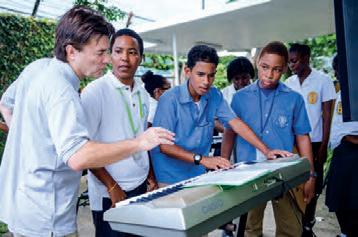
First Citizens is heavily invested in culture and in particular with youth expression in culture. The Young Musician’s Development Workshop
is another such initiative in which the Group is nurturing and supporting youth in national music. The Group works with local and international jazz musicians to host workshops at a number of venues in Port of Spain, San Fernando, Arima and Mayaro, providing young musicians the opportunity to learn directly from professionals in the field. An initiative of the Queen’s Royal College Foundation, the lead workshop facilitator is famed international jazz trumpeter Charlie Sepulveda.
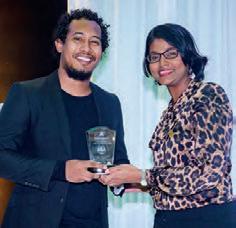


First Citizens and Community
Apart from ‘Youth Development and Education’, First Citizens community engagement programme also supports non-traditional sports such as chess and water-polo and family issues such as housing in partnership with Habitat for Humanity and women’s health through employee volunteerism. The group’s ‘Pink Card for a Cause’ allows each card holder the opportunity to give their support to the battle against domestic violence.
18 T&T CSR REVIEW 2016
The finalists of the First Citizens National Poetry Slam at First Citizens Rhyme, cocktail event.
U.S. professional pianist Tim Portoff teaches techniques and tricks to students of Queen’s Royal College and Woodbrook Government Secondary at the 2015 First Citizens Steelpan & Jazz Developmental Workshops.
Founder and Director, Bocas Lit Fest Dr. Marina Salandy Brown receives a token of recognition for the many successful years of partnership from Ms. Sana Ragbir, General Manager First Citizens Investment Services Limited.
Founder of 2cents Movement, Bocas Lit Youth Outreach Officer and Coordinator of the First Citizens National Poetry Slam Mr. Jean Claude Cournand receives a token of thanks from Ms. Sana Ragbir, GM FCIS.


Tel: 1 (868) 622-2663 or 1 (868) 687-3318 Email: team@virtual-tt.com www.virtual-tt.com VYTT’s globally established practices in ethical PR help clients achieve objectives in ways that are good for business and good for communities. n Communications Strategies & Audits n Reputation & Relationship Management n Executive Coaching & Culture Change n Publications & Editing Services n Media & Stakeholder Relations n Corporate Social Responsibility
The Run for Food
How Massy Stores’ CSR Food Initiative is helping local farmers
This year, Massy Stores launched its first ever ‘Run for Food’ which is inspired by the world-wide “Hunger Run’, an initiative of international agency, Food and Agriculture Organisation (FAO).
The FAO event, formerly also known as the Run for Food race, has been renamed to emphasize the Rome-based agency’s common goal of eradicating hunger. The Hunger Run has three objectives, which are:
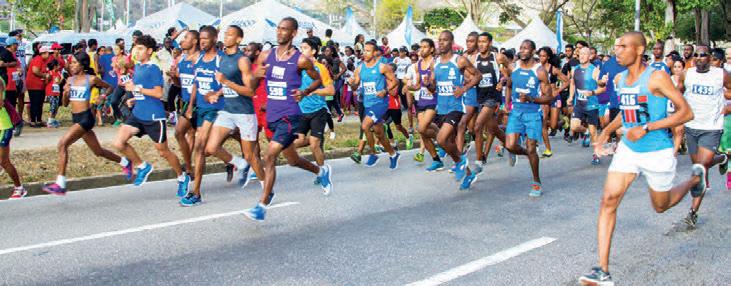
1. to increase awareness of the fact that hundreds of millions of people around the world live in hunger;
2. to raise funds to help hunger-affected communities in developing countries to more food-secure lives; and
3. to build links between the people of Rome and the United Nations food agencies headquartered here.
The Hunger Run usually consists of a 10 km competitive race as well as a 5 km fun run (or walk) through the historic centre of Rome, starting on Viale delle Terme di Caracalla and ending at the Stadium, Terme di Caracalla, in front of FAO headquarters. Proceeds from the FAO Hunger Run registration fees are used to help poor women in rural communities in the Horn of Africa affected by drought and poor harvests.
The TTCSR interviewed Massy Stores CEO Derek Winford to find out some more about their own food run.

So just how did Massy Stores get involved in the ‘Run for Food’?
We preferred the more positive name ‘Run for Food’ to the newly formatted ‘Hunger Run’, but the objectives remain the same. We wanted to sensitise the public to the importance of food security, through supporting locally grown food (farmers) with the aim of reducing dependence on imported food, reducing our food import bill and reducing the demand for foreign exchange.”
Can you say what inspired your food run?
A lot of things came together to make it happen. It was actually born out of a management retreat where we took some time on the agenda to look at how we were delivering service and meeting customers’ needs.
It was our Anthony Choo Quan who threw out the idea of giving back at a time when we had done well despite the economic challenges facing the country. We also thought it would be good to respond to the Prime Minister’s call to increase the consumption of local foods.
20 T&T CSR REVIEW 2016
CSR Story
Participants of the Run for Food start the race
This year the company celebrates 75 years of service in the supermarket industry and although each store has its own unique community outreach programme, we felt it would be more impactful to do something collectively. There was resounding support from the management team to do this, even though the project cost us about half a million to implement.
Massy Stores partnered with the World Food Day National Committee of T&T to champion food sustainability within Trinidad and Tobago, by launching the run on April 4th this year.



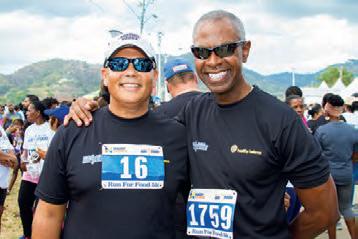
Who benefits from the funds raised?
The Massy Stores at each location all have their own approved charities. We raised $104,000 to support those charities of choice. We distributed funds equally among those named charities. The distribution was done as food vouchers. It really feels good to have everyone at Massy and the public share in the distribution of food to worthy causes. We have had a lot of favourable feedback on this venture. There is a niche of ‘conscience buyers’ who tend to shop where they can see that their grocery shopping dollars can make a difference in the lives of others.
The Massy ‘Run for Food’ does just that.
So how exactly does the ‘Run for Food’ project benefit farmers?
The run is intended to highlight and encourage the sales of local produce and to promote a resurgence of home and kitchen gardens.
We recently did an analysis on our sales and produce. We have over $108 million in annual sales of produce that we sell and about 60-70% is imported. That means that we are doing about $50 million of sales in local produce. Clearly there is a huge opportunity for farmers – at least $100,000 worth of opportunity!
Following the launch of the run, Minister Rambaran contacted us to find out how we interact with and support farmers. I described our central depot and distribution centre to him. This is at the Fernandes Compound where we collect, wash and package fresh produce. It’s where we also quality check and advise farmers on use of pesticides and insecticides and issues such as the use of clean water and the refractory period in the use of chemicals to ensure safe practices.
T&T CSR REVIEW 2016 21
Warming up before the race
Senator the Honorable Clarence Rambharat, Minister of Agriculture (right) with a race participant
Competitors show off their medals
Derek Winford and Gervase Warner, President & Group CEO, Massy
While imported food must satisfy the safety controls of the originating country, here at home, much is left up to the discretion of the local farmers. Higher levels of inspection and compliance are necessary. Middle men don’t quality check but we do. I believe there is opportunity for international agencies operating in Trinidad and Tobago to do their part in educating and helping to regulate the use of chemicals within acceptable safe standards.
We’ve recently started a newsletter with that objective in mind and which is now distributed to farmers at the central depot.
How engaged are your employees in this initiative?
It is an employee volunteer initiative. Our Marketing Manager, Anthony Choo Quan is good at mobilising and motivating people. That same passion has corralled many events including carnival parties. He did all of the internal coordination and our advertising agency managed the PR. Over 2000 people actually ran at the event and that included our own Massy Stores’ employees. At the end of the race, we held a grand farmers’ market where there was an abundance of local produce available for direct purchase from farmers.
The crowd at the run was so big that we had to use 6 instead of the planned 3 lanes when we started off. It was a 5K route which started at Victoria Avenue and continued along St. Clair Avenue and then around the Queen’s Park Savannah.
Our Group CEO sits on the United Way Day of Caring, so as part of our employee volunteer programme, we did a lot of interventions with schools through United Way, to install or improve kitchen gardens. We have provided seeds, soil and tools for a number of schools - even a tiller for the School for the Deaf from Massy Agriculture Department. Some of the vendors at the post-run farmers’ market were kids from the schools.
Ahead of the food run, the company did a passing of “The Penny Peace Plant” which went from school to school

among selected Primary Schools and was finally planted in the Queen Park Savannah on the day of the run. This played a significant role in getting children to embrace the concept of food security and sustainability.
How does Massy Stores source its food items and how is that impacting the local economy?
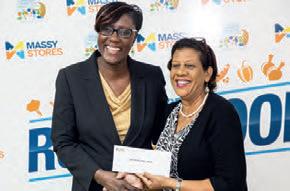
Once you produce the food, we can give you financial returns. It’s a vertical integration process – if they could produce we could sell. In other words, if you grow it, we will buy it; but how you grow it is also important to us. ‘Run for Food’ has actually opened a way for us to help the communities produce and to reinforce the watchwords of “discipline, tolerance and production.”
I believe that If business could reach out and encourage production, it comes right back. It stirs the economy and generates multiple returns.
Contrary to perception, supermarkets are actually ‘price takers’, we cushion the impact of prices to the consumer. We have low mark-ups and rely on volume. Massy is a public company so world economic conditions will determine prices. The value of the US dollar for instance, has a significant impact on operating expenses for us and on returns to our shareholders. This means having to manage the end price to consumers and to absorb some of the shock ourselves.
Benefits to local farmers are also being seen in other Caribbean territories where we operate. In Guyana and St. Lucia we do direct buying from farmers. This builds trust with the local community and fosters important relationships that help with steady supplies and food security. The sharing of ideas between Massy Stores and the farmers is essential to getting the quality of goods and the trading relationship right. These locations also have their own depots for collection, inspection and distribution and we are starting to implement some of the lessons we have learnt here at home to encourage responsible farming there.
22 T&T CSR REVIEW 2016
Donating fees to charities



Nestlé and the Dairy Industry Creating shared value with local farmers
Nestlé’s fundamental belief is that for a company to be successful over the long term and create value for shareholders, it must also create value for society. Internationally and here in Trinidad and Tobago, Nestlé calls this Creating Shared Value (CSV), which begins with the understanding that for Nestlé to prosper over the long term, the communities the company serves, must also prosper.
In Trinidad and Tobago, Nestlé is best positioned to create shared value in three areas: Nutrition, the Environment and Agricultural Development. In the area of Nutrition for example, Nestlé partners with consumers to help them live a healthy lifestyle, not just by producing
nutritious products but by educating customers about wellness. On the environment front, Nestlé is a Caribbean leader in recycling and the reduction of waste.
In the case of the Dairy Industry, Nestlé has a long history of CSV and investment, which began in 1962 when then Prime Minister, Dr. Eric Williams, asked the company to help the country build a national dairy industry.
Today, more than 50 years later, the partnership between Nestlé and dairy farmers is still going strong and Nestlé has invested millions of dollars in growing and improving the industry: In

2015 the company invested $2 million in the industry, a figure which it will match in 2016.
This investment takes the form of a targeted and effective Dairy Development Programme, which was initiated on 22 farms with an average farm size of 22 cows in 2009, and continues today. It begins with training and seminars on topics ranging from improving milk quality to animal health, as well as special bi-annual seminars highlighting farmer achievements in productivity, efficiency and sustainability, and tackling issues affecting the local industry, such as trade tariffs.
24 T&T CSR REVIEW 2016 CSR Story
Nestlé Trinidad and Tobago Limited, Valsayn
Nestlé then drills down to improve activities on the farms themselves by implementing modern, technologydriven approaches to feed and nutrition, fertility, and the health of dairy animals, while developing the entrepreneurial capacity of producers through four specific projects - each with measurable results.
These four key projects are:
1. The Forage & Feeding Project: A lack of good quality forage and affordable supplemental feed for dairy animals has led to poor farm efficiencies and limited growth of the Dairy Farm business in Trinidad and Tobago. Nestlé has helped improve the quality of forage through two projects: the Mulato Grass Project and the Supplemental Feed Project. The Mulato Grass Project, initiated in 2006, helped farmers establish new pastures with improved grass. A parallel Supplemental Feed Project undertaken in partnership with National Feed Mills, established a 16% Dairy Ration specifically for suppliers to the Nestlé Valsayn factory. Together these two projects have increased cow productivity from 7.5kg/cow per day in 2010 to 10.3kg/cow per day in 2012, while significantly reducing the amount of feed used to produce 100kg of milk
from 66kg to 44kg. The result is direct on-farm savings which has increased farmers’ productivity and profitability.
2. The Fertility Project: The Nestlé Fertility Project aims to help farmers better manage the lactation and reproductive cycles of their animals. Nestlé collaborates with the School of Veterinary Medicine at the University of

the West Indies to provide farmers with improved heat detection capabilities, artificial insemination, early pregnancy diagnosis and other veterinary services to ensure reproductive health and yearround sustainable milk production. These interventions have been able to reduce the average calving interval from 514 days to 476 days.

T&T CSR REVIEW 2016 25
The Mulato Grass Project initiated in 2006 has helped farmers improve the quality of forage
3. The Health Project: The Nestlé Health Project uses new electronic surveillance methods to monitor Sub-clinical Mastitis, which can reduce milk productivity by 10-15%. The aim of this project is to achieve a 50% reduction in the incidence of Sub-clinical Mastitis on farms in a 1218 month period.

4. The Farm Management Project: The Nestlé Agricultural Services Department works closely with farmers to implement improved farm management tools and techniques. The company helps farmers with data collection, analysis and feedback for short and mediumterm planning. Farmers receive a detailed monthly report highlighting Key Performance Indicators over a 4-month period, which shows them the true profitability of their operations and highlights high costs and inefficiencies. Nestlé also provides the farmers with on-farm charts and tables containing detailed information on each animal. This allows the farmer to track the progress of each animal through the various stages of lactation, and ensure that reproductive
health, and productivity issues are addressed immediately.
The long-term ongoing relationship between Nestlé and the Dairy farmers in Trinidad and Tobago is the definition of win-win – exactly what Creating Shared Value is intended to be. Farmers and the
industry benefit from the relationship through direct and measurable savings and improved profitability and productivity, while Nestlé is assured that the highest quality milk is available for the production of its wide range of locally produced milk products.

26 T&T CSR REVIEW 2016
The Nestlé Agricultural Services Department works closely with farmers to implement improved farm management tools and techniques.
Nestlé UHT Milk, manufactured at the Valsayn Factory using 100% fresh cow’s milk from farms in Trinidad
















T&T CSR REVIEW 2016 27
NGC AND CORPORATE SOCIAL RESPONSIBILITY (CSR)
NGC’s social philosophy commits to:
• Be a leader and innovator in the field of CSR
• Create shared value for the company and its multiple stakeholders, with a focus on socio-economic and human development
• Exercise responsible stewardship of the aspects of the national patrimony which the company manages or which its operations impact
• Support initiatives which preserve the national identity and heritage
• Adopt a stakeholder approach to all CSR activities
• Ensure transparency and equity in the company’s CSR approach, and in the execution of all CSR projects
• Seek to be sustainable in the way our daily operations are conducted and in the social interventions the company develops, implements and supports
NGC Higher, Faster, Stronger
HIGHER, FASTER, STRONGER…
The National Gas Company of Trinidad and Tobago Limited (NGC) is on track and getting better at growing a healthy society, through its collaborations with organisations and communities in sport.


Sport is one of NGC’s most sustained platforms for community-based intervention. Initiatives date back to the 1990s, when Olympic Gold Medallist, Hasely Crawford, as the company’s Head, Community Relations put his dreams of Track and Field development for Trinidad and Tobago into action.
Over the past two decades of Corporate Social Responsibility, targeting youth development and communities through
sporting programmes, NGC has progressed beyond the role of benefactor and funder. Today, it is partnering with the national sporting organisations which govern athletics, cricket and basketball to improve governance and modernize their management practices in sport.
National Association of Athletics Administration (NAAA)
NGC signed a three-year agreement (2015-2017) with the National Association of Athletics Administrations (NAAA), to support the implementation of the Association’s strategic plan and to facilitate its transition to a model administration demonstrating good governance, transparency and accountability.
28 T&T CSR REVIEW 2016
CSR Story
Alister Narinesingh, NGC’s Community Relations Officer presents an award to officials at the NGC T20 Cricket competition in 2016
The agreement followed the company’s initial one-year sponsorship of NAAA. Review of performance targets in 2014 showed that the Association had made significant headway in achieving its initial priorities. These included doubling the number of technical officials, and attracting more volunteers. The volunteers were trained and went on to support the activities at championship events hosted by the NAAA.
With this support from NGC, the association has made progress towards some key objectives, including but not limited to:
• Development of a draft constitution
• Training and developmental workshops hosted for coaches
• Improved staging of local competitions specifically the Open, Junior and Juvenile Championships
• Athlete development in the form of technical and developmental workshops which covered topics such as anti-doping; responsible decision-making; use of social media; stress management; sports psychology and travel protocols
• Recruitment of technical officials and volunteers for better management of championship events
Other initiatives to benefit from the funding include:
• “Kid Athletics” programme
• Developmental meets
• Participation and presentation for international meets
• Capacity building
NGC Right on Track
The NGC Right on Track (ROT) programme began in 1999. It was school-based throughout the education districts in Trinidad and Tobago. After one year, it was assessed and re-formatted into a programme of “coaching caravans” carrying equipment and coaching staff into communities on the weekdays, Saturday or Sunday (in the case of Tobago) to extend the reach to a larger number of participants.


In 2005, NGC was approached by the Trinidad and Tobago Schools’ Basketball Association to introduce basketball as part of the coaching caravan; it was a natural add-on to NGC’s sponsorship of the Schools’ Basketball League.
Today, when the caravan comes to a community, coaches conduct Track and Field and Basketball training. Before 7:30 a.m. equipment is set up and coaches are available on playing fields. Eager families bring their energetic youngsters, 8 to 19, for an enjoyable day of focused development. Communities in Couva, Moruga and Point Fortin, and those along the “fenceline” to NGC’s facilities are the first beneficiaries.
In each quarter, the caravan moves into different parts of Trinidad and Tobago. Later, the programme was opened to institutions including the St. Mary’s Home, St. Jude’s, St. Dominic’s, St. Michael’s Home for Boys and the Youth Training Centre (YTC) whose gymnasium was restored by NGC and is now a multipurpose hall, allowing the institution to
be very active in the Schools’ Basketball League.
Since 1999, NGC’s Right on Track Development Programme (ROT) has recorded 15,199 participants in 105 communities and 8 institutions, training 88 coaches and forming or restoring 7 sport clubs.
The NGC Right on Track supplements the school-based physical education programme. It continues to provide infrastructural support to clubs, in the form of jumping pits and equipment. The programme also facilitates participation of larger numbers of primary school students in regional and zonal competitions.
The NGC Right on Track programme now includes the NAAA Kids Athletics (Track and Field training) and the NBFTT Mini to Masters Basketball Programme components as feeders for the younger age groups. These partnerships have allowed the ROT team to complete and record assessments and evaluations with a path to continuity.

T&T CSR REVIEW 2016 29
NGC Right on Track, Yolande Pompey Recreational Ground, Princes Town
National Cricket
Since 2012, NGC has been a sponsor of the Trinidad and Tobago cricket team and the official T20 partner of the Trinidad and Tobago Cricket Board (TTCB) in support of its developmental programmes. This is part of NGC’s wider objective to develop cricket at the youth club and national levels.
In 2014, NGC renewed its commitment to TTCB for a three-year period (2014-2016) with a sponsorship package that covered the company’s title sponsorship of the T-20 Festival Competition, sponsorship of the Grassroots Development programme, support to Women’s Cricket, support of the National Cricket Academy, sponsorship of the 50 Over finals and support to the Tobago Cricket Association as well as umpires and the zones.

The NGC/TTCB Academy is an intensive eleven-week camp that provides the opportunity for a crucial turning point in the development of local cricketers. It is preparing players for the next steps in their careers, regardless of their current level. Attendees are exposed to video analyses of their game. They
work with a team of coaches to identify their shortcomings and improve their techniques in batting and bowling. The attendees take part in physical sessions, net sessions and fielding. It also allows talented young cricketers insight into the game, and informs their own decisions to pursue it to the highest levels. The programme allows for personal growth, renewed sense of purpose and the will to succeed.
The 2015 session of the NGC/TTCB Cricket Academy was held at the National Cricket Centre in Balmain, Couva from October to December. The first eighteen candidates attended the Academy for eleven weeks, under the administration of Naushad Mohammed. The inductees to the Academy were chosen through the TTCB competitions, including the NGC T20 Cricket Festival, The National League, 50-over Cricket Tournament and the Secondary Schools Cricket League. The criteria to qualify to attend the Academy included: skill and dexterity on the field; the potential to progress in order to play at regional, national and international levels; and consistency, persistence and passion for the game.
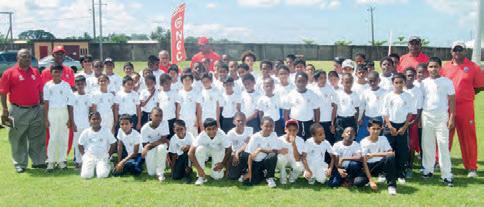
NGC’s
long term goals for the Programme
• To introduce and consolidate the fundamental motor skills (run, jump, throw) in participants as they apply and make the best use of their talent to reach their fullest potential.
• To establish the practice of mass participation in physical activity in order to ensure that Trinidad and Tobago sustains the development of well-coordinated athletes who can meet qualifying standards to compete at the local, regional and international levels.
• To create further opportunities for building capacity in the area of coaching education.
• To further contribute to and shape lives of children and young people and their communities – this will (i) build capacity in the area of track and field and (ii) enable the ROT Coaching Caravan to be more effective in its delivery.
• To promote national interest in, and support for, track and field events, that is stimulated through the achievement of participants in general and athletes in particular at local, regional and international levels.
• To contribute to the current primary education policy, which specifies that physical education is to be examined as part of the Secondary Entrance Assessment Examination.
• To provide an excellent and expanded feeder pool for our Secondary, Tertiary and finally, National Team Players, Coaches and Officials.
• To develop a standardized pathway of excellence from Mini to Masters for Players, Coaches and Officials in Basketball.
• To create and maintain a reliable Data Bank that measures and tracks basketball coaches and players locally and internationally.
30 T&T CSR REVIEW 2016
NGC T20 Cricket
Cricket Grassroot Development Programme Launch 2015
NGC
Corporate Social Responsibility


the potential
UNLEASHING
Whether it’s developing social programmes, providing sponsorship , or ensuring we replant every single tree we’ve lost during pipeline construction, NGC continues to work towards creating a better Trinidad and Tobago by focusing on the broad areas of sport, education, capacity building, arts and culture, environmental preservation and youth and community development.

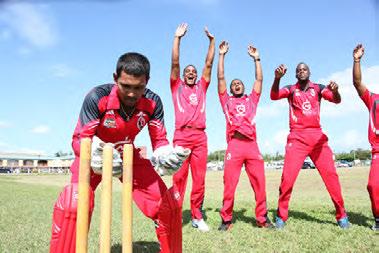


T&T CSR REVIEW 2016 31
RBC Leads the Way Diversity and Inclusion is Good for Economic Growth

RBC has established a model of inclusivity that is progressive and distinctive – one that many companies operating in this diverse region should try to emulate.
Diversity: In broad terms, diversity is any dimension that can be used to differentiate groups and people from one another. It means respect for and appreciation of differences in identity such as gender, ethnicity, age, national origin, disability, sexual orientation, education, religion and other dimensions.
Inclusion: Inclusion is a state of being valued, respected, and involved. It’s about recognizing the needs of each individual and ensuring the right conditions are in place so that each person has the opportunity to achieve his or her full potential. Inclusion is reflected in an organisation’s culture and practices, in addition to its programmes and policies.
In 1977, in response to concerns expressed by women employees, then Royal Bank CEO Rowland Frazee established a Task Force on the Status of Women in the organisation. Those findings which dealt with issues such as mobility, training and job opportunities still form the basis of policies in these areas today. Just two years after that landmark report, Suzanne Lebarge was appointed the first female executive of the bank in Canada. That was almost one decade after Georgette St. Cyr became the first woman to be appointed as a Royal Bank branch manager.
Today, diversity is a core value of RBC. The Bank sees diversity as being able to embrace, harness and leverage the collective differences of its people, for a richer and better society.
According to RBC’s Head of Corporate Communications for the Caribbean, Nicole Duke-Westfield, “Diversity and inclusion is not about ideals, but about actions.” She explains that the organisation has entrenched diversity as a way in which it does business. Based on the Bank’s learnings over the years, diversity plays a critical role in its success and this is why it is incorporated into its strategy. “Organisations like ours that leverage diversity are more innovative, service-oriented and are more effective in attracting and retaining a more diverse workforce,” says Duke-Westfield.
RBC believes that the focus on diversity and inclusion has shaped an organisation that is deeply sensitised to the communities in which it operates and is progressively building a cadre of employees who believe that their differences are respected and valued by the Bank.
Group CEO Dave McKay says, “Diversity and growth are not just integrated, but inseparable…Diversity puts more possibilities into play, and inclusion — going beyond prevailing, predominant or traditional perspectives — makes tapping into those possibilities more likely.” In RBC’s 2016 Diversity Report, McKay said, “There is no question in my mind, that Diversity & Inclusion enriches societies and drives economic prosperity… I’m proud of the role Diversity & Inclusion plays in RBC’s Collective Ambition – our story of what we stand for, why we’re here and how we’ll continue to be successful.” McKay sees diversity as key to the Bank’s growth. RBC aims to be the front-runner in Diversity & Inclusion (D&I) in the Caribbean region – both in how it operates and in the way it does business. Certainly RBC has established a model of inclusivity that is progressive and distinctive – one that many companies operating in this diverse region should try to emulate. Says Caribbean Banking CEO Rob Johnston, diversity at RBC, aims to assure equanimity throughout the Bank’s operations, in areas of “ethnicity, gender, age, national origin, disability, sexual orientation, education, and religion.”
Johnston recalls that he was in Corporate HR at the time when the internal conversation on D&I began. “We would often bump into the glass ceiling. There was a need to pay for like services regardless of age, gender and ethnicity.” The organisation was in discovery stage – paying attention to things like nuances and biases. In Canada, biases against first nation people were high on the agenda; so too was the issue of the LGBT community. Johnston recalls that they moved quickly on the conversation of sexual orientation as “it was an avalanche waiting to occur.” RBC diversity and inclusion is simply good for business; the right thing to do.
32 T&T CSR REVIEW 2016
CSR Story
Johnston’s conviction is that “Diversity in its fullest allows us to build a team that is stronger – one that has the best ideas and the best people. We don’t want homogeneity. Diversity allows for different approaches to business solutions; it also guards against hierarchy in the Caribbean organisation.”
“Further, we value diversity not only in creed, gender, race, culture, ethnicity and sexual orientation but also of thought and opinions. We strive for an open and inclusive culture and there are multiple opportunities where every employee feels comfortable speaking up.”
Caribbean Banking Diversity Blueprint
In 2012, RBC established a blueprint for the implementation and integration of diversity into its Caribbean Banking operations and with it a number of Priority Action Plans for the next five years - i.e.
• Building Workforce Diversity
• Enhance Workplace Diversity;
• Increase Awareness and Inclusion
• Promote Active Leadership.
The Blueprint makes a case for diversity and inclusion as a lever for incredible business and economic potential because of the innovation and creativity that is fostered by the full engagement of different perspectives.
For RBC, diversity includes and goes well beyond basic definitions and respecting employment and regulatory requirements in the jurisdictions wherever it operates. The Bank is clear – “We understand that having diversity is just part of the story; how well that diversity works together is the key. Our framework has evolved to include fostering inclusion and leveraging diversity of thought.”
RBC Employee Resource Groups
The Bank has established Employee Resource Groups–commonly termed the ERGs which are dedicated to helping employees pursue and achieve diversity goals. “RBC Employee Resource Groups help bring together employees from shared
The Women’s ERG
Objectives:
The Women’s ERG is dedicated to promoting women leadership and excellence in the RBC Caribbean workforce. We aim to become more active in the external and internal diverse Caribbean communities we serve, to establish a strong networking support system to all women in RBC and the general banking community. Within our ERG we collaborate with men and women allies across levels and functions to increase inclusion and impact. The leadership team of the Women’s ERG consists of men and women in various stages of their career.
Achievements include:
• Hosted several advice events for women entrepreneurs across the Caribbean
• Hosted Career Chat sessions during Career month
• Hosted panel discussions for International Women’s Day
• Committed to a partnership with the YWCA in Trinidad and Tobago and discussions are underway to expand the partnership throughout the region where the YWCA is present
• Spearheaded the RBC Cares initiative regionally to support over 50 NGOs, over 800 individuals with support of more than 800 employees volunteering their time and donating resources.
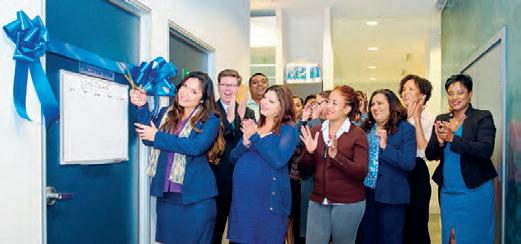
backgrounds and give them a resource to help them develop both personally and professionally.” Modelled after the federal umbrella, the Diversity Council which is established at Head Office in Canada, the Caribbean Banking Diversity Council has established three network groups: The NextGen ERG which works with the under-30 workforce, the Women’s Advisory Board (WAB) which deals with female and family issues and the REACH (I-Care) Resource Group which deals with employees with disabilities or with marginalised members of the community. Each of the three markets of the Caribbean, has an in-market council that implements initiatives and activities in each market.
The blueprint integration is policy-driven and there are a number of Key Performance Indicators to be satisfied in measuring the effective implementation process. Among those KPIs are the number of women in leadership roles, recruitment of persons with disabilities, the number of young professionals in mentorship etc. The Caribbean Banking Division produces a quarterly D&I balanced scorecard against targets and this feeds into the Enterprise (federal) Scorecard. On-boarding or employee induction programmes also include D&I sensitisation and current employees are part of an ongoing awareness campaign. The 2015 D&I outreach week included quizzes, leadership livestream discussions, and personal sharing by employees on living with disabilities.
T&T CSR REVIEW 2016 33
Lactation room – official opening of the lactation room at RBC St. Clair
This creates connectivity and contributes to the assimilation objective of sensitivity and modified behaviours in the workplace.
The Caribbean Banking Diversity Council has accomplished much thus far, including:
• An increase in percentage of persons with disabilities being employed
• Upgrading of facilities to improve access for persons with disabilities

• Established 3 Employee Resource groups (ERGs) – Women’s, NextGen and I-Care
• Braille-ready ATMs
• Braille-ready elevators
• Flexible Work Policy
• Dress Policy adjustments for non-client-facing staff
• Lactation Programme for nursing mothers
• Paternity leave extensions
• Increased (unpaid) maternity leave option
• System-wide celebrations of International Women’s Day and key UN commemorative days
The NextGeN ERG
• Young Professionals Mentorship Programme with Young Leaders
• Employee Volunteerism in community projects
Schools: schoolbag drive (1000 regionally in 2015)
Young Leaders Mentorship
Employee preparation and distribution of RBC Care Packages for NGOs such as women’s’ shelters and children’s homes
2015 launch of the Community Leadership Award
Active Leaders – i.e. transfer of knowledge and expertise by senior managers to youth in the home markets.
Despite the fact that there are still many corporate entities still sadly lacking behind RBC in addressing the issue of diversity and inclusion, Duke-Westfield admits that there is still more to be done. “We need to enhance workplace advocacy for deeper sensitization and behavioural shifts; going beyond the physical to address the mental and emotional changes needed to work side by side with the disabled.”
Objectives:
The NextGen is a movement to enable RBC employees in their 20s and 30s to build connections with peers and leaders while creating positive impact within RBC and in the community. We are built on three guiding pillars: Career, Community and Connections.
Achievements:
• Hosted speed mentoring between NextGen and senior leaders, where every ten minutes our members got an opportunity to connect with a different leader
• Hosted video conferences over a four week period with special speakers. Over 100 persons participated using social media to connect to the session on building personal brand.
• Hosted a Mix ‘N Mingle social offsite - in person and informal.
The I-Care ERG
Objectives:
I-CARE like REACH in the federal configuration has a mission to eliminate the stereotypes and stigma associated with people with disabilities and to drive engagement and performance through awareness, education, coaching and accommodation. The regional ERG aims to support and enable employees to fully contribute and reach their full potential in the workplace.
Achievements:
We are just months old having launched in December last year. Our main thrust this year has been the formation of an on-line support group of 105 persons for RBC caregivers, focussed on four areas of care:
• ‘Self-care’ which is about the personal health and wellbeing of caregivers
• ’Child-care’, we advocate for and provide support for a number of issues such as flexi-time for parents, extra maternity/paternity leave, and things like afterschool care
• ‘Elderly care’ - time and counselling is provided for persons involved in caring for the elderly like aging parents
• ‘Community care’ gets us out and active in the communities we live and work in. We had a School Bag Drive which provided bags and school supplies for 1000 students in our regional markets.

34 T&T CSR REVIEW 2016
RBC cares – Members of RBC Cares ERG delivers care packages to the Corpus Christi Children’s Home
RBC Olympian Shanntol Ince shares her experiences with Young Leaders at the NextGen Mentorship session
Caring for
to build stronger communities and a better Trinidad and Tobago
Our commitment extends far beyond supplying the products and services that meet your financial needs. We understand that we are only as strong as the neighbourhoods in which we live and work, and so at RBC we are dedicated to empowering people through significant investments in the communities in which we operate.
For more than three decades we have been doing just that through our Young Leaders Programme which has helped thousands of teenagers in Trinidad and Tobago and the Eastern Caribbean realise their full potential. Starting this year, RBC entered into a partnership with the internationally-acclaimed, youth organisation Free The Children that both enhances and broadens the programme, cementing our reputation as a bank that deeply
values the sustainable development of young people.
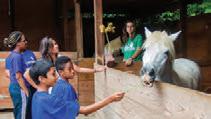
We’re also providing much needed financial support to cancer patients through the RBC Caribbean Children’s Cancer Fund and are aligned with several non-governmental organisations that are doing amazing work with children and teens.

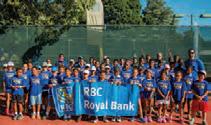
The RBC Blue Water Project™ has allowed us to partner with local organisations that are working to ensure that we have access to water we can use, both now and for future generations.
In the field of sport, we are supporting youth tennis and football and in the arts we are the proud sponsor of the annual RBC Focus: Filmmakers’ Immersion, an intensive development programme for emerging filmmakers from the Caribbean and its Diaspora.
As we serve our communities our goal is to make a positive and sustainable impact through investments in education, the arts and culture, health, the environment, sports and social services.

None of this would be possible, however, without the tireless efforts of our employees who remain passionate about participating in the bank’s volunteerism programme which allows them to nominate a charity of choice for financial support.
At RBC we understand that caring for YOU means partnering with others to build stronger communities and a better Trinidad and Tobago.
It’s All About You
 WE say Y.E.S was formed with the aim of saving young lives and creating a positive future for the youth of the Laventille area and environs. The goal of the programme is to promote and cultivate youth entrepreneurship through education and career opportunities for the youth of the community. The values of Integrity, Respect and Caring, considered to be important in developing successful citizens, will support the entrepreneurial spirit and infuse positive mindsets, responses and actions.
For more than 35 years, RBC has been supporting junior tennis in Trinidad and Tobago and the RBC Junior Tennis Tournament is only one of the tournaments on the calendar.
RBC Volunteers give of their time to Horses Helping Humans (HHH), a non-governmental organisation that provides therapeutic horseback riding (known as hippotherapy) to children with special needs.
More than 100 Young Leaders participated in the annual 2016 RBC Younng Leaders Leadership Conference facilitated by our education partner WE/Free the Children movement.
WE say Y.E.S was formed with the aim of saving young lives and creating a positive future for the youth of the Laventille area and environs. The goal of the programme is to promote and cultivate youth entrepreneurship through education and career opportunities for the youth of the community. The values of Integrity, Respect and Caring, considered to be important in developing successful citizens, will support the entrepreneurial spirit and infuse positive mindsets, responses and actions.
For more than 35 years, RBC has been supporting junior tennis in Trinidad and Tobago and the RBC Junior Tennis Tournament is only one of the tournaments on the calendar.
RBC Volunteers give of their time to Horses Helping Humans (HHH), a non-governmental organisation that provides therapeutic horseback riding (known as hippotherapy) to children with special needs.
More than 100 Young Leaders participated in the annual 2016 RBC Younng Leaders Leadership Conference facilitated by our education partner WE/Free the Children movement.
S.C.G. (Caribbean) Group Ltd is a subsidiary of Chinese state-owned company - Shanghai Construction Group, registered locally with responsibility for the parent company’s business in the Caribbean and Latin American. The company provides general contractor and integrated services to a range of mid-sized, large and mega projects in the region.
Headquartered in Trinidad and Tobago, over the past decade S.C.G. Caribbean has completed twelve different projects for a number of clients and end-users, continuously delivering the highest levels of satisfaction. The company has distinguished itself through delivering high quality and innovative building solutions on-time and within-budget; with world-class levels of reliability and a deep commitment to safety.
At an average of 40% local content of contract value, over the years, S.C.G. Caribbean has established long-term partnerships with a number of local professionals, suppliers and subcontractors that have brought tremendous value to development for both the company and the industry. It’s a win-win business model – delivering innovative, high quality construction solutions to support the economic, cultural and sporting well-being of Trinidad and Tobago and the wider region.
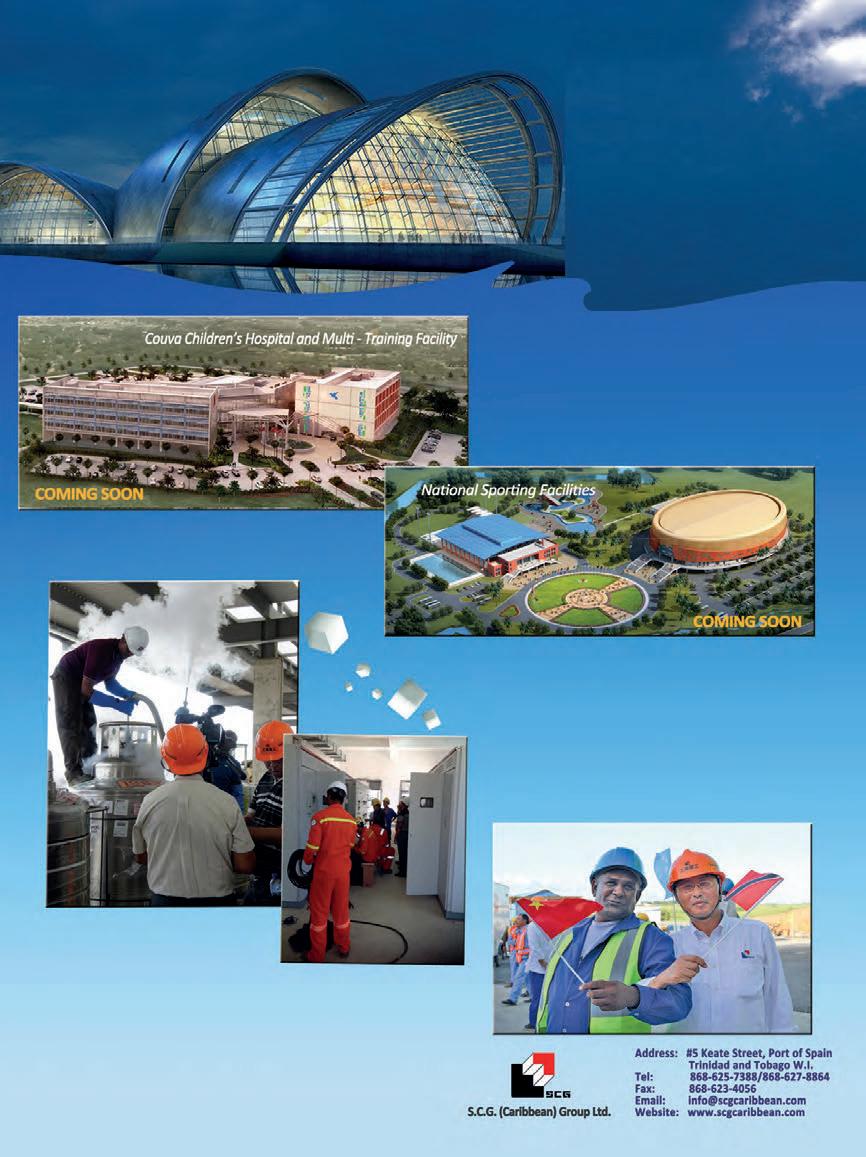
S.C.G. (Caribbean) Building a foundation for the future. Together. Stronger.
Harmony as a Fundamental Principle
SCG’s CSR aims to better lives in T&T
Since the Chinese first came as indentured workers in 1806, Trinidad and Tobago has attracted and welcomed many different groups from China. They bring their families, their food, their culture to enrich and enable the vibrant melting pot that is this nation. Today, China continues to add to the diversity and development of Trinidad and Tobago, and other Caribbean states, with investment and infrastructure. The Shanghai Construction Group (SCG), one of the largest construction companies in the world, has spent the last ten years in Trinidad building impressive public spaces for the arfts, sport, and a much-needed children’s hospital. Now, SCG is eager to provide solutions for diversification of the Trinidad and Tobago economy.
“Together we aspire, together we achieve,” Trinidad’s national motto coined by its first Prime Minister, is a favourite saying of Michael Zhang, Managing Director of SCG International (Caribbean), subsidiary of the largest Chinese construction company. Zhang sees harmony as the fundamental principle in his work in Trinidad and Tobago representing the goodwill of China and a Chinese state-owned company. “We are here to enhance the relationship between our two countries, by sharing the experiences and modern development of China with Trinidad and Tobago. We believe that people here – as in China – want to enjoy better lifestyles, living standards and public facilities. What we were able to achieve in Shanghai in less than a generation is possible here. We are not so different.
SCG has the experience and expertise for Trinidad and Tobago’s development and diversification. We are willing to work together.”
Shanghai Construction Group emerged out of the effort to modernize China which began in the sixties. The Group was registered in 1994 in Shanghai, around a core of engineers, architects, planners and builders with experience in town planning, construction of high-rise buildings, public administration centres, bridges, highways, industrial plants, and sport facilities. The modern city skyline of Shanghai is a testament to the company’s decades of development work. The company is the “pride of Shanghai,” says Peter Zhang, Deputy Marketing Manager of the Caribbean subsidiary.
Today, Shanghai Construction Group (SCG) has international operations and subsidiaries building and completing projects in cities in North America (USA and Canada), Africa and the Caribbean. SCG International (Caribbean) was registered in Trinidad and Tobago in 2005 to construct a series of public projects. In Trinidad and Tobago, these include the two buildings which house the National Academy for the Performing Arts in Port of Spain (NAPA) and San Fernando (SAPA), the Couva Children’s Hospital, national sporting facilities (aquatic centre, tennis centre and cycling velodrome) and community centres. SCG Caribbean has also completed the Marriott Hotel in Guyana; a thermal power plant in Belize; and other works in Jamaica, Barbados, Dominica and Antigua & Barbuda.
In just ten years, SCG Caribbean has emerged as one of the leading construction companies in the region, offering technical capabilities in project design, planning and construction, and competitive pricing. Early projects, with funding from the Government of the People’s Republic of China, brought worker teams from China. Since then, however, the company has been moving to more local content in its projects in Trinidad and Tobago. Local contractors, suppliers and skilled workers account for the majority of the workforce on projects. In this way, SCG Caribbean has positioned itself as an efficient competitor and strong supporter of the local construction sector. SCG is a member of the Trinidad & Tobago Chamber of Commerce and the Trinidad & Tobago Manufacturers Association.

The core competency of the Trinidad and Tobago-based company is project management with a small cadre of technical and administrative staff resident in the islands. Under the leadership of Michael Zhang, SCG Caribbean has deepened its relationship with local contractors and sectors of the local community whose aims match the drive to excellence in construction and aspiration to healthy harmonious human development of SCG.
The CSR philosophy of the still developing company SCG Caribbean, is based on the simple premise that the projects selected and advanced by SCG are a means of fulfilling social responsibility to the people of Trinidad and Tobago.
T&T CSR REVIEW 2016 37 CSR Story
Michael Zhang says, “Our commitment to Trinidad and Tobago is to fulfill people’s need to achieve better lives. We do this best through our core business.”
That being said, the company does offer assistance to deserving individuals and organisations, says Peter Zhang, the company’s Deputy Marketing Manager, who is in charge of public relations. Not related to the managing director – “In Shanghai, Zhang is a popular surname” – Peter arrived in June 2014. Trinidad and Tobago attracted him because his research suggested that it is “one of the happiest countries in the world.”
“Through our Managing Director Michael Zhang who has been here from the inception of the company in 2005, we have selected needy cases for assistance. For instance, we have contributed to surgeries in dire medical cases. We have also supported young Trinidadians who may turn out to be bright and ambitious in academics or
the arts; these are some extremely talented individuals. Through these interventions, our company is learning more about Trinidad and Tobago, its diverse communities and citizens.”
SCG is naturally interested in the history of Chinese and the integrated heritage in Trinidad and Tobago. In 2014, the company commissioned a documentary called “Fortitude” to commemorate the 40th anniversary of diplomatic relations between China and Trinidad and Tobago. The film was named after the first ship that brought Chinese labourers to Trinidad in 1806. The film was presented at the finale of the Chinese Film Festival in 2014.
The company also sponsored the film about Dai Ailian. Couva’s Lotus tells the story of the girl born in Couva Trinidad who became a ballerina. She returned to China where she devoted all her life to Chinese dance and was dubbed “Mother of Chinese Dance.”
In the same year, SCG sponsored and organised the East Meets West cultural show featuring artistes from China.

38 T&T CSR REVIEW 2016
SCG in collaboration with Rey Del Ritmo Dance School presented the 2013 Caribbean South American Dance Championship and showcase at the Cascadia Hotel and Conference Centre. Above: Mr. Michael Zhang of SCG (platinum sponsor) poses with the winners of the competition.
“Our commitment to Trinidad and Tobago is to fulfill people’s need to achieve better lives. We do this best through our core business.”
Sporting events and activities have also received contributions from SCG. In 2016, the company is the main sponsor of the National Cricket League. They have also sponsored football and the 2015 International Sporting Conference.


In 2016, SCG continues to seek specific interventions with culture. Earlier this year, they looked for opportunities to “carry the banner of SCG” with groups that were representative of Carnival, but which were also associated with excellence.

The relationship with Rosalind Gabriel’s children’s band brought the employees much joy as they followed the band on the streets, on the stages, and to the top prizes.
“Of course, some of these initiatives are for public relations, “ admits Peter Zhang, “but we are still searching to understand Trinidad and Tobago, its happy mix of people and unique culture.”
Michael Zhang confirms that SCG is committed to development in Trinidad and Tobago, and to the Caribbean. “Together we aspire, together we achieve, is the perfect motto for the relationship between Trinidad and Tobago, and China. We believe in co-operation and development for the benefit of both; we will spare no effort to share - people to people - our experiences, culture, resources, prosperity. This is our corporate social responsibility, as a Chinese company, and a company in Trinidad and Tobago.”

T&T CSR REVIEW 2016 39
Dragons vs Rush
SCG sponsorship of the National Cricket League
On the field of play
Dragon’s Trophy
A Powerhouse for Cricket Professionals
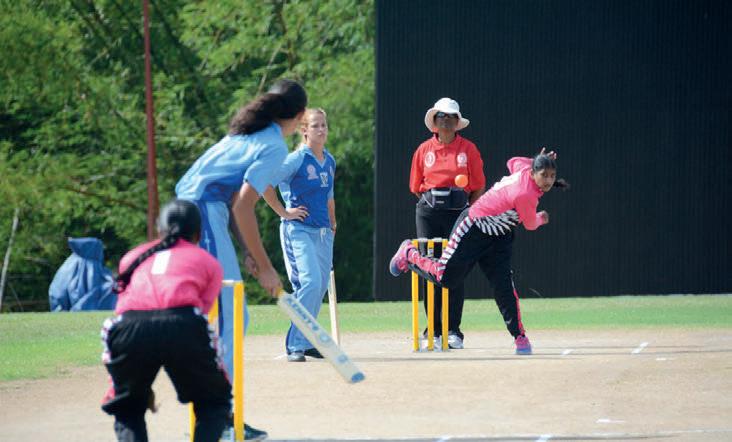
PowerGen’s investment in sport is paying dividends

Leg spinner Samuel Badree has a knack for knocking over important wickets in big tournaments. At the ICC World T20 final in April this year, Badree tumbled two of the biggest English threats, setting the West Indies on their way to an improbable title. The 35-year-old bowler with the receding hairline and the big game instincts had burnished his reputation with a memorable outing. He could return to his other life, as assistant coach of PowerGen Penal Sports Club.
Badree might well be the perfect example of a sportsman whose career has been positively influenced
by corporate sponsorship. Playing for Naparima College in his teens, PowerGen was there, just starting out on its twenty year sponsorship of the Secondary Schools Cricket League. Then from the age of 16, he played for PowerGen Penal Sports Club. Now he’s back—assistant coach of his former club for the past three years.
Youth development is the theme of PowerGen’s CSR. While it may be gratifying for the company to claim a small role in the creation of international stars, there’s equal satisfaction in knowing that thousands of unheralded
young men and women have enjoyed countless hours of honest competition because PowerGen funds paid for their equipment or got them a coach.
Francois Ottley, the power generation company’s liaison with the PowerGen Secondary Schools Cricket League (SSCL) for the past six years, says the business has stuck with cricket sponsorship because the developmental path from youth to senior cricket is so clear. Trained technical people are spotting talent and guiding it through. For some, graduation means the end of their playing days. Others go on to the bright lights.
40 T&T CSR REVIEW 2016 CSR Story
Girls’ T20 Intercol Finals – Cedros Secondary bowls to Holy Name Convent
This year’s Boys’ Twenty20 Intercol final between Barrackpore West Secondary and Carapichaima East Secondary drew a big crowd and was broadcast on TV and radio. Sport media hyped the matchup of two teams that had met in a close final two years before. “You get to see stars before they become stars,” says Ottley of the intense interest in secondary school playoff competition. “And when they become big, you can say, ‘I knew this man when he was playing in school.’”
PowerGen’s theme for its 20th anniversary of supporting the Secondary Schools Cricket League is ‘The Power of 20’. The company says, despite the closure of its Port of Spain power plant and a reduced power purchase agreement from T&TEC, it intends to maintain its yearto-year commitment for the upcoming season at least. “We’re actually proud to boast that we did not reduce or eliminate sponsorship,” says Ottley. “It’s

something we’re particularly proud of so we fight very hard to keep it going.”
In Penal, PowerGen civil technician Chaitram Ramjitsingh is earnestly hoping for continued sponsorship of the PowerGen Penal Sports Club. As club president, he knows how crucial the company’s support has been to developing sport in the catchment surrounding the Penal power facility.
“We depend on PowerGen to make things happen,” says Ramjitsingh flatly. Thanks to PowerGen, the club is one of
only two in the country with an indoor nets facility, a boon to players of all ages when the weather is uncooperative.
The PowerGen-sponsored Youth Development Camp, held around Easter for the past 20 years, gives 75 to 100 players exposure to coaching and practice games, with motivational speaking and lessons thrown in when the budget has allowed. From the camp, a range of age group teams are chosen. Many players have gone on to represent Trinidad and Tobago at Under-19 and senior levels.
T&T CSR REVIEW 2016 41
PowerGen’s theme for its 20th anniversary of supporting the Secondary Schools Cricket League is ‘The Power of 20’.
Girls’T20 Intercol Winners –Three time winners Cedros Secondary with Representatives from PowerGen and Secondary Schools Cricket League
As with any CSR initiative, PowerGen expects accountability for its funding. SSCL is expected to produce annual financial reports for audit, and the league’s accounting officers (mostly secondary school teachers who administer everything from player homework classes to equipment purchases) have twice been sent on financial training courses for NGOs.
“They work fairly well,” says Ottley of the league’s accountants, “but if you expect a standard of someone, you have to expose them to what is
expected.” The sponsor is also working on a procurement structure for league implementation.
After two decades, PowerGen wants to know more about the impact of its CSR. For the first time, a survey will be handed out to players and emailed to coaches and administrators. The feedback will help improve administration by providing data that hasn’t been gathered before: The number of students participating, the ratio of boys to girls at the larger schools, whether funding was sufficient to meet the league’s needs. “Saying it’s
a good thing, how far will that really go if I have to justify at an executive level or a board level?” asks Ottley. “I want to be able to give you metrics and figures. It makes for a stronger case if you’re having financial difficulty.”
Secondary schools cricket remains the feeder for the semi-professional clubs. Ottley says players at that stage are “very much aware” of their potential and their possible trajectories. The best go on to impress at the highest level. And some even end up right back where they started.

42 T&T CSR REVIEW 2016
From Left – Krishna Rampersad, Head – Engineering, Reliability and Support Services, Denise Labadie-Sudan, Manager – Human Resources and Corporate Communications makes a presentation to Mr. Surujdath Mahabir, President of the Secondary Schools’ Cricket League
Gourmet Catering


You know you have something to say, we can help you say it.

Interested in developing your voice as a more effective communication tool?
Could you use some assistance in adding more impact to your presentations and speeches?
Inkings offers
• Voice coaching and training workshops in presentation skills and public speaking for your specific needs.
• Customised Training and Coaching to help you express yourself and communicate at your best, whether for day-to-day purposes, to improve your presentation skills or in preparation for a keynote event.
• Media training.
Our services have been utilised by persons in politics, diplomats and business executives as well as rising employees in marketing and self-employed individuals. Clients include public and private sector organisations, small business operators and Non Governmental Organisations.
Thinking of developing a radio programme or feature and want high quality production? We can also help you with that.
Inkings: professional training and facilitation services by Garfield and Barbara King inkings@gmail.com | Tel: (868) 646-3158, (868) 774-0965, (868) 383-9888 | gkingtt@gmail.com | bakingtt@gmail.com

How the Young Prince built his brand
By Robert Clarke
Check out @JehueGordon’s Twitter feed and you’ll find video of the 2013 400 metre hurdles World Championships gold medallist vigorously flicking heavy ropes in the gym before dropping dramatically to the floor. “This rope is a killer,” he writes on his feed. It’s a glimpse into the training regimen of a world-class athlete.
We can all imagine the hours of gruelling exertion required for an athlete to compete against the world’s best. Not many of us have thought of the effort required to get the financial support to allow the athlete to put in those hours.
The 24-year-old hurdler, who has taken the uncommon decision to train locally rather than accepting a track and field scholarship at a US college, has three local
sponsors helping him on his way to the Olympics in Rio. Bmobile has sponsored him since 2008, Toyota since 2013, and Courts recently accepted his proposal for a partnership. “It’s not about being fortunate or getting lucky or anything like that,” he says when asked if he considers himself fortunate since only a relatively small proportion of local Olympic-calibre athletes are afforded corporate support. “In order to achieve, you need to work hard. You need to put in that work, you need to put in the hours required.”
But as Brian Lewis, President of the Trinidad and Tobago Olympic Committee (TTOC) points out, athletes are competing for scarce corporate CSR funding, not only with other athletes but with other causes. Sporting success therefore has
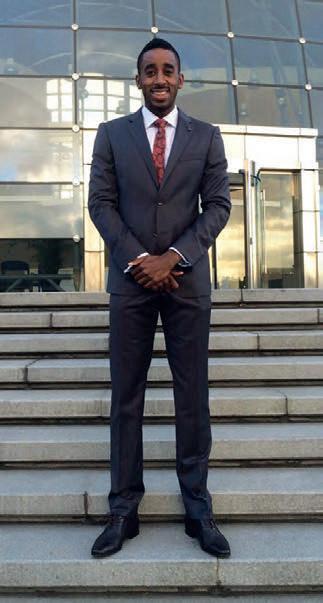
to be complemented with a strong personal brand. (That means building a strong personal brand to complement your sporting success.) “There are some athletes who are better at building their brand,” says Lewis. “But we don’t have a tradition of that, so you can’t expect athletes to wake up one day and go counter-intuitive to the culture.”
Lewis has been beating the drum of market-focused change, urging sporting organisations and athletes to consider the marketing principles behind an “association” rather than viewing corporate support as an entitlement. Marketing jargon spills out of him: winwin, compelling selling proposition, market-driven metrics. The athlete must perform and make himself desirable.
44 T&T CSR REVIEW 2016 CSR & Sports
Jehue Gordon, 400m hurdler
More than sporting success
Jehue has built a brand. He graduated from UWI with Honours, hosts a TV programme interviewing other top athletes, and he stayed local. He tweets under the persona Young Prince, emphasizing “Ambition” and “Hard Work”. “We try to push a brand whereby I’m a young ambassador for Trinidad and Tobago. I’m a growing individual who is aiming to inspire the youths and the future of Trinidad and Tobago,” Jehue remarks.
In terms of promoting mutual benefit, he’s on the same page as the TTOC President. Jehue’s sponsors expect that he’ll make himself available for speeches and school tours, mostly in the off-season, when he isn’t consumed by training. He posts to Instagram and has 6,000-plus followers on Twitter. Apart from sharing bits of his training regimen, general sports news, and the results of fellow athletes, he’ll occasionally use his social media platforms to acknowledge his sponsors.
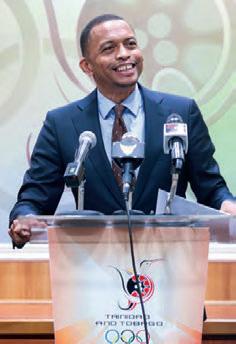
What is corporate T&T looking for in an athlete? In announcing the choice of Olympic-bound sailor Andrew Lewis as one of his company’s three sports brand ambassadors, Flow’s Managing Director Brian Collins said when he met the yachtsman for the first time: “Andrew was cool, well dressed and extremely affable. Now we know more. Following his accident in December we’ve all come to know the survivor who is extremely passionate about life and his sport.” Passion and presentability: It’s a tiny window into what guides corporate decision-making. Plus, everyone roots for a survivor.”
Jehue says he accepts that business is about maximizing profits, but points out that the list of sponsored athletes is relatively short: swimmer George Bovell, Andrew Lewis, javelin thrower Keshorn Walcott, sprinter Richard Thompson, and himself. There are others, but not that many. “To be honest, I don’t give them wrong, but I give them wrong at the same time,” says Jehue, equivocating about the
level of support from corporate T&T. “If you’re supposed to see sports on a global level and what it does—for the individual, for the brand, for their company and also for the country—then they should not think twice about investing in athletes.”
The criteria for accessing the Ministry of Sports’ Elite Athlete Assistance programme were recently changed, which meant a cut to Jehue’s state funding. To an athlete, who gets “picked”, this can seem capricious. “The market still is not the way you would expect it to be, because it’s not just about me, it’s also about the other athletes. What about the other athletes who are just as successful, but are not really getting the same support? Or those who are probably not as successful, but are getting more support?”
Brian Lewis puts the onus on the athletes and the sporting organisations that often lobby for funding on their behalf. He wants to see a movement away from the “begging bowl kind of approach” to one where the sporting body tries to “strategically discern” what a company wants in return. “You have to now identify where the win-win is because at the end of the day, sport can’t really compete in the philanthropy market with HIV/AIDS, breast cancer, that kind of thing.”
Since Lewis believes that sport can’t outcompete other causes for CSR funding, he says stakeholders must convince the private sector that they can drive sales. Sponsorship becomes a marketing relationship. “If it is I can prove to you that I can generate off of my social media, or my database access, $50 million a year in sales—I’m just calling a figure—then the valuation of that association is based on an expanding figure. Whereas on the CSR side, you may have $3 million for CSR.”
He admits, however, that there are drawbacks to viewing athlete sponsorship as an investment opportunity requiring a measurable return on investment. If Corporate Social Responsibility no longer exists, deserving athletes will be left behind. “The downside of that,” says Lewis, “will be National Sporting Organisations and athletes and stakeholders that aren’t able to deliver best-in-class from a branding perspective, will struggle.”
Others will flourish. With only a few meets left before Rio 2016, Jehue hopes to peak at just the right moment to stride smoothly to the Olympic podium. It would be the ultimate way to satisfy all concerned. Most of all, the Young Prince himself.
T&T CSR REVIEW 2016 45
Jehue has built a brand. He graduated from UWI with Honours, hosts a TV programme interviewing other top athletes, and he stayed local.
Brian Lewis, President, TTOC
Sporting Interventions A tripartite approach to stemming violence in society
 By Wendy Singh
By Wendy Singh
The 2010 Report of the CARICOM Commission on Youth Development revealed that the Caribbean region has one of the highest rates globally of crime and unemployment among youth. In response to this situation, the CARICOM Social Development and Crime Prevention Action Plan (SDCPAP), which was jointly developed by CARICOM and the UN Office on Drugs and Crime (UNODC), was launched in 2011 following endorsement of the Plan by CARICOM’s Council for Human and Social Development (COHSOD) in 2010. With support from UNDP, the CARICOM Secretariat organised several consultations on “Youth Gangs and Violence: partnering for prevention and social development”, to discuss a roll out
strategy and servicing component for the anti-gang programmes. According to the news release following the CARICOM Forum, “the plan is rooted in sound theory and research which indicates that in Canada, the US, Europe and other countries, social interventions have spawned positive results; they are costeffective, and provide additional social benefits. ‘Researchers now conclude that social interventions can yield positive, measurable benefits within three years, with reductions in crime of 25% to 50% within 10 years.’” (Stabroek News, November 30, 2011).
Securing livelihood and well-being
According to an Antigua Observer newspaper report on October 5, 2011,
the Plan is designed to respond to the spiralling violence among Caribbean youth and is described by Ms. Myrna Bernard, the Officer in Charge of the Human and Social Directorate at the CARICOM Secretariat, as “one of the most important regional initiatives for securing the livelihood and well-being of Caribbean peoples, especially our youth, through the eradication and mitigation of violence”. The newspaper report further states that the services and programmes are designed “to reduce involvement in gang life and to equip ‘gang leavers’ with life skills to help them reintegrate into their societies.”
These programmes are made up of various activities, but must respond to
46 T&T CSR REVIEW 2016
CSR & Sports
the specific needs in each community. In Trinidad and Tobago, the Ministry of National Security is reportedly carrying out programmes in 22 violence plagued communities through the Citizens Security Programme, which include: “skills-based training and other training interventions, community signage and beautification, public education campaigns, spelling and football competitions, health care and funding for smaller community based projects – a similar initiative is being implemented in Belize” (CARICOM Forum on November 25, 2011). Similarly in Belize, the St. Kitts Observer newspaper (November 1, 2011) reported that this initiative is viewed as “a non-violent means of using dialogue and social interventions to transforming gangs into a positive community building tool and re-integrating gang members as productive contributing citizens into their communities”, through programmes of sports, music, dance, arts and academics. To date, 90% of gangs in Belize have bought into the initiative, which has resulted in a reduction in the murder and crime rate. The newspaper report further noted that the Commissioner of Police of Belize, Mr. Crispin Jeffries, said that the programme has the “potential to transform the mind-set of gangs and the culture of gang violence in Belize.”
Countering violence
It is important to note that these programmes in Trinidad and Tobago and in Belize all use sports in promoting the reduction of violence among youth. Research has shown that juvenile crime rates are lower in communities where sports-based youth development programmes are available to at-risk youth, since they help to foster strong relationships between individuals. Edwin Moses in his article of November 4, 2015 in the Huffington Post titled The role of Sports in Addressing Youth Violence explained that “these programmes often result in community cohesion, which promotes the acceptance of people from different backgrounds and encourages strong and positive relationships between these individuals.” He went on
to emphasise that these programmes are not only helpful with preventing crime, but also with lowering recidivism rates since they help to steer these persons “in the right direction through mentorships and physical activity.”
Belize has gone a step further in implementing their programmes by involving the private sector to counter violence by applying a community-building approach. The programme RESTORE Belize, which is located within the Office of the Prime Minister, was launched in 2010 to target the root causes of crime and violence and to promote “a strategic and comprehensive cross-sector effort involving state institutions, the private sector and civil society”. Matt Budd in his article Belize: Challenges and Contradictions in Gang Policy (April 7, 2015), stated that this programme “engages in human development activities focused on the Southside of Belize City, developing infrastructure including recreational and social facilities for youth as well as rehabilitation facilities for youth offenders.”
innovation financing programme, which would allow it to reach out to the private sector for “up-front capital funding for programmes” that would be reimbursed by the state only if the programme was successful. The non-profit organisation United Teen Equality Center (UTEC) was chosen to introduce its nationally recognised workforce programme to Lawrence, including job training.
Corporate partnerships
UTEC was specifically selected because of its previous successful programmes in reducing high rates of juvenile recidivism in other states. UTEC’s services for one young person cost $10,000 a year, while the annual baseline cost for incarceration for this same youth would cost the state $46,000 annually (excluding costs for education, mental and general health care services). The arrangement is that if the social innovation programme achieves the recidivism rate by an agreed upon percentage, then the state would use the cost savings to pay back investors. This initiative is therefore viewed as an investment, not a grant (Boston Globe, May 27, 2012).
The involvement of the private sector in crime prevention is not new. For instance, Lawrence, Massachusetts in the USA, which had been experiencing a 44 percent increase in violent crimes between 2010 and 2011, and where the majority of the shooting and stabbing was among people below the age of 25, decided to adopt a programme that had only been tested in the United Kingdom in an attempt to lower the incidences of violence among youth. The state of Massachusetts launched the social and
Investments such as these are usually supported by shareholders. At the same time, they offer corporations a chance to build more sustainable societies in countries where they operate since they have the opportunity to strengthen their collaboration with civil society groups in building human capital and creating societies that are more economically stable.
T&T CSR REVIEW 2016 47
Research has shown that juvenile crime rates are lower in communities where sports-based youth development programmes are available to at-risk youth, since they help to foster strong relationships between individuals.
































Catherine Kumar Business and the CSR Evolution
CEO of the Trinidad and Tobago Chamber of Industry and Commerce
By Robert Clarke
The last time T&T faced a deep and prolonged economic downturn (and we’re yet to find out how protracted this one will be), it was the mid-1980s and Catherine Kumar was at ALGICO. The current CEO of the Trinidad and Tobago Chamber of Industry and Commerce recalls that the concept of CSR was not then widespread in corporate T&T. When the recession bit, it was easy for businesses to justify cuts to social spending. It was philanthropy, after all, and charity is optional.

But at some time in the 1990s, postrecession, CSR momentum gathered. More companies formalized their social spending with board-approved policies that were likely to endure. “And we moved from the world of philanthropy and donations, to CSR,” says Kumar.
While it wasn’t quite as dramatic as waving a magic wand, a shift in corporate thinking saw businesses placing themselves within the context of the larger society or (society at large?). To an extent, it dawned on hardnosed businessmen that a company’s performance was inextricably linked to societal well-being, even if some senior execs were more grudging than others. The move precipitated broader, sustainable participation in CSR policy. It was no longer: “This year I feel like doing this. Next year…”
The Chamber of Commerce itself came to the table late. ” We have a committee here, a CSR Committee,” says Kumar, referring to a file in front of her. “It has been around for quite a while,” she adds, looking for the date of establishment.
50 T&T CSR REVIEW 2016 Conscious CEO
“Yes, 2007. I take that back! Some of our committees have been around much longer than that. That means even from the Chamber’s point of view then, we even got involved at a much later date than maybe the rest of Trinidad and Tobago.”
But get involved the Chamber did, promoting the benefits of CSR to its membership and asserting that: “Through CSR policy, you actually can become more competitive.”
Chamber workshops on developing CSR policy steered members toward establishing frameworks, but decisions on whether CSR should be funded from a percentage of sales, or bottom line, or another figure altogether, were left to the businesses. “We’ve had members come back and talk to us,” says Kumar, “who have now said that they have a CSR policy in place. And you feel good about that, that you’re able to take them from doing nothing to one where they have a policy in place and you know that it’s set up and running well.”
The metrics are the tricky part. It’s one thing to assert that CSR can make you more competitive; quite another to quantify a return on investment. “It is one of those things where it is hard to measure return, just like corporate advertising, but it is still something that you want to do.”
Drawing on her banking background— Kumar has been Country Head of RBTT Bank and has served as President of the Bankers’ Association—she suggests that CSR can be considered part of Corporate Governance. Demonstrating good Corporate Governance might enable a business to negotiate a better lending rate with a bank, for example. But Kumar says it’s best to rate CSR in terms of its own success: “How is our CSR working? Are we in line with what we planned to do?”
The Chamber has its own, longstanding CSR initiative; one that Kumar is proud of.
Jump Start has been around for 20 years, providing career exposure to secondary school students through placements with mentors in the field they’d like to get acquainted with. The programme has grown to 100 students a year, all of whom are being versed in CV-writing, interview etiquette, teamwork and financial planning.
As the economy has contracted, Jump Start sponsorship has followed suit. “So the Chamber has to carry part of the cost. And we certainly would because it is considered something, at the board level, that we want to do and we will do. And if we have to carry the cost, we want to do it. It’s not something we’re going to give up on.”
The motivation for CSR can’t be all dollars and cents. It requires a genuine, somewhat unselfish commitment to social engagement. But the desire to keep Jump Start going, for the student who’d like to know what Optometry is really like, is also about the Chamber brand. “I think it’s recognizing that the Chamber is about business. Business is about making money. We don’t want the only image of the Chamber outside there to be that all we do is help companies make more money and make more money. We also want the image to be, how are we helping the youth develop? How are we helping them to be better persons for tomorrow, how are we helping them to mature?”
And speaking of brands, Kumar believes that it is cynical to suggest that consumers aren’t paying attention to the work of good corporate citizens. “I think we underestimate people and their values. And generally most people are concerned about the values of other people around them and the values of corporations around them.”
Yet, banks are often characterized by their customers as profiteers. And collectively, Kumar believes, “they’re probably the biggest contributors to any CSR projects.” While positive engagement with the
national community can enhance your brand, other factors also influence a company’s image. In the case of the banks, Kumar says, the average person judges them by their absolute returns— the dollar value of their profits. From a business perspective, it might be fairer to judge them by another metric—return on investment.
The Chamber CEO contends that intense focus on the bottom line, to the exclusion of all else, leads to shrinking profits. She admits to knowing companies that “shave every little cent” off of costs that aren’t perceived as integral to doing business. But many others aren’t so myopic. “Companies are realizing that the more you focus on other things— bringing good to the society, being there for your employees—your topline will grow, your employees themselves will become more innovative and want to do more for the company, and your bottom line will ultimately grow.”
The key to CSR sustainability, Kumar says, is to convince senior executives of its value. “If they were more involved and really understood the impact, you would see a lot more CSR and you wouldn’t see it being chopped.”
It’s projected that the economy still has some contracting to do. Businesses are already facing stark choices. “Especially during times when things are tight, I think (the commitment to CSR) has to be a genuine, deep-seated concern and commitment,” says Kumar. If it’s implemented just to match strides with the competition, it’s unlikely to survive. “The companies which keep their CSR programmes going, even in the hard times, are the ones I would say, have a genuine concern for the society they live within.”
T&T CSR REVIEW 2016 51
Reptrack’s 2016 Analysis puts Google, Disney and Rolex at the Top of the Reputation Index


Every year the Reputation Institute undertakes research and in-depth analysis on which companies are gaining support through strong brands. The company’s research continues to highlight the value that social responsibility is playing in distinguish brands and increasing ‘likeability’ for both investors and customers. Reputation Institute’s RepTrak® model is the gold standard for reputation measurement, providing a one-of-akind appraisal of how the general public views the world’s best-known companies. The RepTrak® database examines 15 stakeholders in more than 25 industries and more than 40 countries for more than 7,000 companies. Following is a summary of the Institute’s RepTrak’s published highlights of the 2016 results.
Competition Is Growing Stronger
In 2016, it is more difficult for a company to ensure its spot on the 100 most reputable companies across the globe. The average RepTrak® Pulse of the 100 most reputable global companies has increased by 1.1 point since 2015 and 1.7 point since 2014. This indicates that a company can no longer only maintain a strong reputation, but must constantly strive to improve it and stay ahead of the competition.
This trend is even more visible when broken down to the 15 markets (Australia, Brazil, Canada, China, France, Germany, India, Italy, Japan, Mexico, Russia, South
52 T&T CSR REVIEW 2016
CSR
Lessons
Korea, Spain, U.K. and U.S.). Out of the 100 companies that make the list, only 6 are in the top 10 across the majority of the markets. Rolex, the top company overall, ranks in the top 10 across 11 markets, the most out of all companies. Sony, Google, The Walt Disney Company, Samsung and LEGO Group also ranked in the top 10 in a majority of markets. Only Google is perceived as one of the top reputable companies across all four main geographical regions: North America, EMEA, Latin America and Asia. When comparing the regions, it is more difficult to break into the top 10 in North America and EMEA than in Latin America and Asia.
Top Companies
With such strong competition, what makes the most reputable companies stand out? In 2016, three companies top the reputation list: Rolex, The Walt Disney Company and Google. The three companies have very close strong scores: 78.4 for Rolex, 78.2 for Disney and 78.1 for Google. To have the best reputation in the world, you need to have high levels of trust with consumers across all 15 markets we studied. To earn the trust and respect of consumers, companies need to deliver on a variety of expectations: from high-quality products, to open communication, to having a strong vision for the future and caring about your employees. Rolex, Disney and Google have been able to build a reputation platform across all seven dimensions of reputation. They have achieved this consistently throughout the past few years. In addition to their individual strong scores across all dimensions, Rolex, Disney and Google are overall leaders across dimensions. For instance, Rolex ranks first when it comes to products and services, Google tops workplace and performance, and Disney tops the governance and citizenship dimensions.
Products and Services Continues to Be the Top Driver of Reputation
In 2016, the key drivers of reputation are products and services, governance and innovation. For the past three years, the key drivers have remained
consistent. Following the 2008 financial crisis, the general public started assigning more weight to the Corporate Social Responsibility (CSR) dimensions, which are governance, citizenship and workplace. As reputable companies have been regaining consumers’ trust, CSR dimension scores have been improving, and their weighted importance has grown. In a state of stability, the general public returns their focus on products and services and innovation. Still, governance remains as the second most important dimension. These key drivers of reputation vary across countries.
Lack of Corporate Narrative
Even the 100 most visible and wellknown companies are struggling to get their message across to consumers. The majority of the general public is aware of the company’s product, but when the focus is on the enterprise there are a lot of question marks. Specifically, 58% of the general public is uncertain as to what these companies are doing when it comes to workplace and citizenship, and 54% are uncertain of companies’ activities in governance. These stakeholders are fence-sitters who can swing either positively or negatively depending on the information that companies share. Companies that are able to communicate and engage across the seven dimensions with consumers via their company story will see a massive improvement in recommendations and willingness to buy their product.
Support Is Strong for Companies with Strong Reputations
One of the main values of the RepTrak® model is that it connects reputation to business outcomes. When it comes to supportive behaviors such as willingness to buy products, recommend company or trust company in a time of crisis, only companies with a strong RepTrak® Pulse range (70-79) achieve support above 50%. This support would rise to 80% for a company with an excellent score (>80), but no company achieved an excellent score in 2016.
Decline of Volkswagen and Impact on Auto Industry
Amid the recent diesel emission scandal, Volkswagen’s reputation dropped by 13.7 points across the globe. This drop resulted in Volkswagen going from number 14 in the 2015 Global RepTrak® 100, to number 123 in 2016 with an average score of 61.3. The biggest decline was a 17-point drop in the governance dimension. Citizenship saw a 15-point drop and leadership saw an 11-point drop. Consequently, with the decline of its reputation, Volkswagen experienced a drop across all supportive behaviors.
How did Volkswagen’s crisis impact the reputation of the auto industry?
2016 data shows that while the overall industry average dropped by 2 points, the reputation of other individual automakers was not affected.
This article is a summary of the 2016 Global RepTrak® findings. Reputation Institute is the world’s leading research and advisory firm for reputation, providing global companies the single-best way to measure, communicate and manage reputation performance. With this insight, companies can protect their reputations, analyse risks and drive competitive advantage. The Institute serves more than 400 of the top Global 1,000 companies. To learn more about the 2016 Global RepTrak® 100 study and find out what companies top the list, contact Kasper Ulf Nielsen, Executive Partner, knielsen@reputationinstitute.com or visit www.ReputationInstitute.com
T&T CSR REVIEW 2016 53
Rolex ranks first when it comes to products and services, Google tops workplace and performance, and Disney tops the governance and citizenship dimensions.
Justice Delayed and Business -
Why a failed justice system costs businesses
Recently, the head of the Roman Catholic Church of Trinidad and Tobago, Archbishop Joseph Harris, led a petition “seeking to free remand prisoners who have been behind bars longer than the maximum prison term they would have gotten if they had been found guilty of their crimes”. In 2014, World Prison Brief estimated the prison population in Trinidad and Tobago at 3,481, and that as many as 59% of this population was being held on remand. The Archbishop requested the clergy to encourage parishioners to sign this petition as it may “concretise the year of mercy” in their jurisdiction (The T&T Guardian Newspaper April 25, 2016). Current Attorney-General Faris Al-Rawi, who supports the Archbishop’s initiative, commented that “12 percent or 268 people who have been charged for lesser
By Wendy Singh
In 2014, World Prison
offences including child maintenance and traffic offences”, could benefit from this pardon.

In Trinidad and Tobago, and in almost every Commonwealth Caribbean country, there are long delays in administering justice, which has resulted in higher rates of detention in overcrowded prisons, with both prisoners and prison staff enduring deplorable conditions. Former Chief Justice Sharma of Trinidad and Tobago described these conditions as “disgusting and sickening” (Newsday, September 17, 2004). Research confirms that in many instances, remand prisoners who are unable to participate in any prison programmes due to their unconvicted status, are held in these conditions for longer periods than they would have been given when eventually sentenced.
Brief estimated the prison population in Trinidad and Tobago at 3,481, and that as many as 59% of this population was being held on remand.
Delayed justice is not in keeping with fundamental rights enshrined in the constitution of Trinidad and Tobago, which guarantees “the right to be brought promptly before an appropriate judicial authority” for persons who have been arrested or detained (Cap.1, Pt. 1, S.4(b)). It should be noted that these rights are similarly enshrined in the constitutions of other Commonwealth Caribbean countries.
54 T&T CSR REVIEW 2016 2014 CSR Lessons
Both UNDP (in its First Caribbean Human Development Report in 2012) and the World Bank (“Socioeconomic Costs of Crime” www.worldbank.org) have warned that high rates of crime are adversely affecting development in our region. These spiralling rates are not only attributable to a dearth of crime prevention programmes, but to a failure to implement effective social reintegration programmes for prisoners, which inevitably results in high recidivism rates. Both state and nonstate actors bear some responsibility for this phenomenon. While the state bears primary responsibility for the care of prisoners, the public and private sectors have failed to invest the necessary human and financial resources for materials for skills training, educational programmes for prisoners and prison officers, and capacity building for prison staff. In addition, many civil society groups have not shown much interest in working with prison administrations to assist with the development and implementation of inprison and post-release programmes. In most instances, civil society groups are unable to assist with these programmes since they lack the necessary financial resources. Perhaps, this is an area where corporate entities could help.
The World Bank found that crime has a detrimental effect on tourism arrivals in the Caribbean, “discourages business investment, and stifles economic growth” (www.worldbank.org). For instance, while no data was available for Trinidad and Tobago, findings indicated “that Haiti and Jamaica could boost economic growth per capita by 5.4 percent per year if they were to bring their homicide rates down to the levels of Costa Rica. Guyana and the Dominican Republic would also benefit substantially, with potential growth rate increases of 1.7 percent and 1.8 percent respectively”. The 2012 UNDP report states that CARICOM estimates placed the annual direct expenditure on crimes by gangs (primarily composed of young people) to
be between 2.8 percent and four percent of GDP in five CARICOM countries (Antigua and Barbuda, Guyana, Jamaica, St. Lucia and Trinidad and Tobago), due to the high cost of policing coupled with lost income caused by the imprisonment of youth and the drop in tourism rates. Both state and non-state actors would welcome economic growth during this current global economic recession.
David Jessop re-affirmed in his article “Crime has an adverse effect on Caribbean development” in Stabroek News (January 27, 2013), that a number of reports indicated that crime not only
causes human suffering, “but it can cause capital flight, the loss of those with skills or education who prefer to work in a more certain environment, and changes for the worse in the perception of a nation’s investment climate”. He further stated that “studies by the InterAmerican Development Bank (IDB), the University of the West Indies and others show that crime also is having a negative effect on social development by diverting limited resources away from health and education to security, the control of crime and the provision of facilities necessary for the administration of justice”.
It is clear that failure to invest in curbing crime rates, whether they be at the primary and secondary levels (preventive), or tertiary level (investing in social reintegration programmes for prisoners), will adversely affect businesses and negatively impact development in our region. For instance, AttorneyGeneral Faris Al-Rawi said: “it costs $20,000 to $25,000 a month to maintain someone who may not have been able to pay a $12,000 fine. In addition, the state spends 80 million dollars a year moving remand yard prisoners to and from courts across T&T. The estimated cost includes having a prosecutor assigned to each case, a police officer, health costs and others. If the 12 percent on lesser offences were to benefit from the request by the Catholic Church that would be roughly 270 prisoners, there would be a saving of $6.75 million per month”.
Perhaps the time for making a change is now. With the current global economic decline, the crime situation can only worsen if left unchecked. Certainly, it is time for the judiciary to give serious consideration to speeding up the trial process for remand prisoners; for Caribbean governments to re-prioritise their budgetary allocations; and for corporate entities to re-assess where and how they are implementing their social programmes.

T&T CSR REVIEW 2016 55
It is clear that failure to invest in curbing crime rates, whether they be at the primary and secondary levels (preventive), or tertiary level (investing in social reintegration programmes for prisoners), will adversely affect businesses and negatively impact development in our region.
Mercy and the LawA Judicial System in Gridlock

56 T&T CSR REVIEW 2016
CSR Lessons
In response to the Archdiocese’s petition to free prisoners found “worthy of pardon and mercy” the T&T Catholic News asked attorney-at-law Gregory Delzin about the process and what’s preventing matters from moving forward. With several cases now years old and waiting to reach the courts; and with an increasing number of persons waiting in remand yard for ten years and more, Delzin gives his perspectives on what’s wrong with our judicial systems.
“The legal system is in gridlock because there are not enough courts, judges and staff including prosecutors to proceed with the matters once they are in the system, and the system is operating under an archaic set of rules which do not allow for efficiency.
“The police service itself cannot perform simple things like background checks without delay and the support services like forensic analysis are overwhelmed and understaffed. The support systems are not computerized and linked to allow for speed. Even the system for granting bail is still based to a large extent on ownership of land where a surety is ordered so that where an accused person does not own land, or someone does not allow their land to be used as a surety, the accused cannot access bail and is forced to remain in remand.
“The system encourages corruption, for example, where professional bailors use their land for a fee as a basis for a surety. In short, if an accused person is poor, and bail is ordered, that person is unlikely to access bail, even though he/ she is presumed innocent.
“The underlying reason that all of this has developed is because society refuses to treat with persons in prison, whether convicted or in remand, as entitled to the
same considerations of human dignity as anyone else. Therefore, there is no social or political pressure placed on decisionmakers to allocate resources to persons whom society perceives as undeserving of mercy. We also presume that everyone in prison somehow deserves to be there.
“We therefore, quite deliberately, turn a blind eye to the suffering that is imposed by deliberate neglect, ostensibly on behalf of law abiding citizens. More than that, a climate has been created, that allows the decision-makers to avoid dealing with the issues because of a fear of the accusation that the allocation of resources to criminals or “presumed criminals” deprives law abiding citizens of scarce resources.
“There is also a social or class element to the problem. There is a perception and belief that the poor are accustomed to hardship and therefore are not affected to the same degree as someone who comes from a “good family” and they could more easily withstand and adapt to prison hardship.
“This perception removes the urgency from dealing with the issues. In short, even though most people will accept, in theory, that everyone is entitled to be treated with dignity and must not be treated cruelly or inhumanely, the application of that belief in our individual judgments is coloured by social class perceptions. And that approach is reflected in the lack of social pressure that is placed on the decision-makers, to radically improve the system.
“There is a third aspect. While the law mandates a jury to presume innocence when a person is being tried for an offence, in truth, the average person presumes guilt the moment we read in the papers that a person is “assisting the police with their investigations.”
“As a result, we presume that persons on remand are there for good reason, that they are criminals, even though, when they finally reach trial the jury is told to presume them innocent. This assumption undermines any pressure to make it possible that persons on remand are allowed access to a system that will make it possible for them to remain free while they await trial.
“In our system, bail must be set for all criminal offences, from possession of one joint to murder. We therefore have a mindset that any person charged with any criminal offence must start with the presumption that they must be set apart from society.
“Prison is designed to incarcerate and punish the guilty. Remand punishes those who are presumed to be innocent if it is for an inordinately lengthy period with no access to a trial.”
Note: This article is reproduced courtesy the Trinidad & Tobago Catholic News (May 1, 2016 issue)
Gregory Delzin is a Senior Advocate with over 20 years at the Bar, Former Acting High Court Judge, Former Member of the Statutory Authorities Appeals Tribunal, Associate Tutor at the Hugh Wooding Law School; and has made appearances before the High Courts and Courts of Appeal of Trinidad, Barbados, St Lucia, Grenada and Guyana; before the Privy Council in the United Kingdom in its Appellate capacity and the Caribbean Court of Appeal. He specializes in Civil and Commercial Litigation, Judicial Review, Criminal Litigation, Construction Law, Industrial Relations Law, Commercial Arbitration, International Trade Disputes Settlement, Environmental Law, The Law of the Sea and The Law and Policies of International Tribunals.
T&T CSR REVIEW 2016 57
I could have been a shooter
His Grace, Archbishop Harris speaks out on crime and social justice
 By Donna Ramsammy
By Donna Ramsammy
It is difficult to reconcile the strong words with the grey-headed, bespectacled gentleman who is carefully and thoughtfully choosing his words as he is asked about the current debate within the Inter-Religious Organisation (IRO) on his call for justice for prisoners “being held on remand”. His Grace, Archbishop Joseph Harris is surprised that there could be any challenge to what many have seen as a rational and well-founded demand for human rights and the appropriate application of the law.
The debate has arisen out of an appeal by him, as Archbishop of the Roman Catholic Diocese of Port of Spain, for the immediate release of prisoners who are being held on remand for extraordinary periods. The Church defines extraordinary as having been held beyond the time one would have served had one actually been tried and convicted. Many prisoners have been held for years – for some, as much as ten, without trial. He sees this as a breach of their fundamental human rights and a grave social injustice. He points to successive governments, a failing legal system and a very inadequate education system for the demise, and the resulting cycle of poverty and crime.
“Hell Yard in the Beetham is what keeps me awake at night,” he responds to our prompt on what troubles him the most about the current social issues facing youth in Trinidad and Tobago and why the call for mercy is particularly relevant at this time. Young men, he believes, have been given a raw deal by successive
governments. Leaving school functionally illiterate and unable to secure meaningful work leaves very few options open for survival.
“Were it not for my parents, I too might have been a shooter!” declares His Grace. It’s difficult to believe that this respected scholar might have found himself in such a situation, but for the ‘lashes’ of a persistent mother. He laments the failure of an education system with a bias for Euro-centric definitions of a person’s worth. It has created “a people with a deep inferiority complex.”
The system, says His Grace, also “does not make adequate provisions for expressions of being Trinbagonian or being simply human; and it does not address learning styles and aptitudes.”
He himself loved philosophy and ecology and husbandry while still in high school but due a restrictive curriculum, he was unable to explore these interests until he joined the priesthood. It is only then his love for nature and living things flourished. As a former parish priest of Arouca, he had even set up an organic farm in the area, where he reared goats, sheep, rabbits and layers.
“People need to experience self-worth”, he urges. From his perspective, we need a model of humanity that affirms multiple demographics, embraces diversity and shows mercy to all. “Throughout history,” His Grace explains, “the writings of the fathers of the Church speak about a God of mercy. Mercy is in fact an attribute of God that we most experience.” This characteristic of God is being
58 T&T CSR REVIEW 2016
Young men, he believes, have been given a raw deal by successive governments. Leaving school functionally illiterate and unable to secure meaningful work leaves very few options open for survival.
CSR Lessons
celebrated and made to come alive by the universal Church as Pope Francis as Head of the Catholic Church has declared this year, ‘The Jubilee Year of Mercy’. The Church as he sees it, responds to the call to carry out the work of God by showing mercy.
Archbishop Harris reflects on the wellknown parable of the ‘Prodigal Son’ who had wasted his wealth on wine, women and parties. Depleted and marginalised, the errant son eventually comes to term with his folly and he determines in a cataclysmic moment, “I will get up and go to my father’s house.” He finds a father not just waiting, but eager to welcome and return him to his former status. His Grace believes that this is how God is with us – not a God with a black book or one who instils fear – but the one reflected in the life of Jesus as a revelation of the Father; the Jesus who was healing the sick and forgiving sins and teaching all about mercy. He explains that this is the essence of the scripture that compels us to go make disciples or followers of His way; and to see God in the poor, hungry, and naked around us as requiring action.
Archbishop Harris explains that at an annual gathering of the local priesthood, one priest emphasised the importance of not just having good ideas, but of doing good. He called for an active faith that would exemplify the mercy of God at work in the local Church. The entire clergy supported his call for intervention in the Remand Yard in Port of Spain. “This was a way to make the mercy of God incarnate”.
“This is not just about forgiveness”, he explains. There is a real legitimacy in the request to free those persons who are being held without trial. Rights to a trial are enshrined in the constitution but hundreds are being held for years in breach of these fundamental human rights.
A major concern for His Grace is the fact that the poor have no means to secure bail as they possess no property. So, it
is the poor who languish in the Remand Yard and not those with means. While others continue to have the comfort of family and the opportunity to work while awaiting a very slow judicial process, the poor wait in jail. There is no fairness in this. But as he points out, most people in the wider society are not concerned because there is a general desensitisation to the marginalised. This cause-andeffect of waiting in jail is also polarised by geography and ethnicity. This is why “Hell Yard” is always at the top of his mind. He emphasises, that there must be a responsible and cohesive intervention to break these cycles. This for him, demands a collaboration of state and civil society.
for three, five, or seven years, “is not only unreasonable, it is unjust.” And where is the justice, he wonders, in jailing a man for child maintenance, and then keeping him in jail away from his child for years, and when he comes out he cannot get work to support the same child because of his record?
His Grace believes that once these men have been freed, that systems must be immediately put in place to prevent any further backlog. He advocates for community service as an alternative to incarceration and for the immediate establishment of a night court served by Justices of Peace to process backlogged cases. A mediation court could also be set up to work in conjunction with the night court to process new cases within 48 hours of persons being detained. Under the Mediation Act of Trinidad and Tobago (Act No. 8, 2004), the Family Court could offer mediation. A judge, magistrate or Social Services of the Family Court could refer you to mediation during your court matter. In addition, Individuals can also visit the Family Court and request mediation services. He also recommends that for petty crimes which are all eligible for bail, that magistrates be more discretionary in their requests for surety and make allowances for people to be bailed on their own recognisance where possible.
The Archbishop is clear that he is not dealing with major crimes like murder or drug trafficking. He is focused on those persons who have been incarcerated for allegedly having a joint of marijuana, for petty theft or for child maintenance. Most of these have more than paid for a crime they have not yet been proven to have committed.
The critical thing here, he elaborates, is not only have they spent more time in jail than the maximum sentence would allow; but that they have not been proven guilty. “Our laws state that we are innocent until proven guilty.” So holding men that are not guilty of a crime
The Archbishop knows that this is a problem that can easily be addressed by the Director of Public Prosecutions (DPP), since by his approval alone, the unusual and extraordinary detention of some 2,000 men in Remand Yard can be fairly and justly processed.
The Archbishop has drafted a petition which could be signed at Catholic churches throughout Trinidad and Tobago or online via the diocese’s Facebook page. Corpus Christi was identified as a cut-off date for the petition. However, he continues to lobby the Office of the Attorney General and the Office of the DPP to ensure that the appeal gains traction with those with the authority to change the status quo.
T&T CSR REVIEW 2016 59
While others continue to have the comfort of family and the opportunity to work while awaiting a very slow judicial process, the poor wait in jail. There is no fairness in this.
TRINIDAD & TOBAGO CORPORATE CSR DIRECTORY
Name: Ansa Mcal Group of Companies
Address: Head Office, 11th Floor Tatil Building, 11 Maraval Road, Port of Spain
Contact: Ms. Sharon Balroop
Position: Manager, Corporate Communications
Phone: (868) 625-3670/ (868) 624-8753
E-Mail: Sharon.Balroop@ansamcal.com
Web: www.ansamcal.com
Name: Angostura Group of Companies
Address: Corner Eastern Main Road and Trinity Avenue, Laventille
Contact: Ms. Giselle Laronde-West
Position: Senior Manager, Public Affairs & Communications
Phone: (868) 623-1841 Ext. 257; (Fax) (868)-623-1847
E-Mail: glarondewest@angostura.com
Web: www.angostura.com
Name: Atlantic LNG
Address: Princes Court, Cor. Keate and Pembroke Streets, Port of Spain
Contact: Ms. Camille Salandy
Position: Head of Sustainability & Corporate Operations
Phone: (868) 624-2916; (Fax) (868) 624-8057
E-Mail: csalandy@atlanticlng.com
Web: www.atlanticlng.com
Name: Shell Trinidad
Address: 5 St. Clair Avenue, Port of Spain
Contact: Mr. Leslie Bowrin
Position: Head, Social Performance
Phone: (868) 628-0888; (Fax) (868) 622-6520
E-Mail: leslie.bowrin@bg-group.com
Web: www.bg-group.com
Name: BHP Billiton Trinidad &Tobago
Address: Invaders Bay Tower, Audrey Jeffers Highway, Port of Spain
Contact: Ms. Carla Noel-Mendez
Position: External Affairs/Community Manager, TTPU
Phone: (868) 821-5146 (Fax) (868) 635-9255
E-Mail: Carla.Noel-Mendez@bhpbilliton.com
Web: www.bhpbilliton.net
Name: BP Trinidad & Tobago LLC
Address: 5-5a Queen’s Park West, Port of Spain
Contact: Ronda Francis
Position: Manager, Corporate Responsibility
Phone: (868) 623-2862
E-Mail: franrh@bp.com
Web: www.bp.com
Name: Blink|B-Mobile (Foundation)Address: TSTT House, 1 Edward Street, Port of Spain
Contact: Ms. Anjanie Ramesar Soom
Position: Manager, Corporate & Community Affairs
Phone: (868) 624-5703; (Fax) (868) 623-3836
E-Mail: aramesa@tstt.co.tt
Web: www.tstt.co.tt
Name: Blue Waters
Address: #2 Orange Grove Estate, Trincity
Contact: Pradeep Suvrin
Position: Sales & Marketing Manager
Phone: (868) 640-8824; (868) 289-8824
E-Mail: Pradeepsuvrin@bluewatterstt.com
Web: www.bluewaterstt.com
Name: Carib Glassworks Ltd.
Address: Eastern Main Road, Champs Fleurs
Contact: David Hadeed
Position: Marketing Manager
Phone: (868) 662-2231
E-Mail: david.hadeed@ansamcal.com
Web: www.caribglass.com
Name: Caribbean Airlines Ltd.
Address: Piarco International Airport, Piarco
Contact: Ms. Alicia Cabrera
Position: Senior Marketing Manager
Phone: (868) 669-3000 Ext. 2992; (Fax) (868) 669-1520
E-Mail: aliciacabrera@caribbean-airlines.com
Web: www.caribbean-airlines.com
Name: Centrica T&T Limited
Address: Eleven Albion, Corner Albion and Dare Street, Port of Spain
Contact: Mr. Ko Jacobs
Position: Country Manager
Phone: (868) 821-700
E-Mail: ko.jacobs@centrica.com
Web: www.centrica.com
Name: Citibank (Trinidad & Tobago) Limited
Address: 12 Queen’s Park East, Port of Spain
Contact: Ms. Lesley Taylor-Gouveia
Position: Public Affairs Officer
Phone: (868) 625-1040 Ext. 6906
E-Mail: Lesley.taylorgouveia@citi.com
Web: www.citibank.com/trinidad
60 T&T CSR REVIEW 2016 Directory
Name: CL Financial Group
Address: 29 St. Vincent Street, Port of Spain
Contact: Ms. Crystal Lapope-Bradshaw
Position: Senior HR Officer
Phone: (868) 625-4444, Ext. 1217
E-Mail: crystall@clico.com
Web: www.clico.com
Name: Colonial Life Insurance Company (Trinidad) Limited
Address: 29 St. Vincent Street, Port of Spain
Contact: Mr. Gerard Barnes
Position: Senior Manager, Corporate Communications
Phone: (868) 625-4444 Ext. 1530; (Fax) (868) 625-4440 Ext 1621
E-Mail: gbarnes@clico.com
Web: www.clico.com
Name: Columbus Communications Trinidad Ltd. (FLOW)
Address: 29 Victoria Square, Port of Spain
Contact: Ms. Monique Mata
Position: Corporate Social Performance Specialist
Phone: (868) 224-2348
E-Mail: mmata@columbustrinidad.com
Web: www.columbustrinidad.com
Name: Courts/UNICOMER (Trinidad) Ltd
Address: 22 Mulchan Suchan Road, Chaguanas
Contact: Ms. Bhano Surujbally
Position: Marketing Unit
Phone: (868) 672-7577; ext. 2317; (Fax) (868) 672-1984
E-Mail: tbhano_surujbally@unicomer.com
Web: www.unicomer.com www.shopcourts.com
Name: Dansteel Ltd.
Address: South Trunk Road, La Romain
Contact: Mr. B. John
Position: Marketing Manager
Phone: (868)- 627-8335; (868) 623-6731
E-Mail: bjon@bhsil.com
Name: Digicel Trinidad & Tobago Ltd
Address: Ansa Centre, 11C Maraval Road, Port of Spain
Contact: Penny Gomez
Position: Corporate Communications Manager
Phone: (868) 355-5508
E-Mail: penny.gomez@digicelgroup.com
Web: www.digiceltt.com
Name: Direct TV Trinidad Limited
Address: 31 Mulchan Seuchan Road, Chaguanas
Contact: Ms. Tamara Ragoonath
Position: Marketing Manager
Phone: (868) 672-8111 Ext. 1410
E-Mail: tragoonath@directvtt.com
Web: www.directvcaribbean.com
Name: EOG Resources Trinidad Ltd.
Address: 10-12 Sweet Briar Road, St. Clair
Contact: Ms. Lisa Steele Pujadas
Position: Mgr. Corporate Communications & External Affairs
Phone: (868) 622-8653 Ext. 25652
E-Mail: lisa_steele-pujadas@eogresources.com
Web: www.eogresources.com
Name: First Citizens Bank
Address: 2nd Floor, DHL Building, Cor. Churchill Roosevelt
Highway & El Socorro Extension Road, El Socorro
Contact: Ms. Jennifer Armstrong Khan
Position: Senior Communications Officer
Phone: (868) 623-4778 Ext. 5857
E-Mail: Jennifer.Armstrong-Khan@firstcitizenstt.com
Web: www.firstcitizens.com
Name: Flavorite Foods
Address: 128 Boundary Road, San Juan, PO Box 597, POS
Contact: Keenon Roper
Position: Marketing Manager
Phone: (868) 638-2236/7, 2221
E-Mail: kroper@flavoritefoodstt.com
Web: www.flavoritefoodstt.com
Name: HCL Group of Companies
Address: Long Circular Mall, Long Circular Road, St. James
Contact: Mr. Colin Carty
Position: Marketing Manager
Phone: (868) 622-4925; (Fax) (868) 628-7156
E-Mail: colin.carty@hcltt.com
Web: www.hcltt.com
Name: Happi Products
Address: 82 Bamboo Settlement #2, Valsayn
Contact: Brent Salick
Position: General Manager
Phone: (868) 645-5040, 645-5041, 645-5365
E-Mail: brent@happiproducts.com
Web: www.happiproducts.com
T&T CSR REVIEW 2016 61
Name: Hilton Trinidad Hotel & Conference Centre
Address: 18 Lady Young Road, Belmont
Contact: Ms. Darlene McDonald
Position: Director, Sales and Marketing
Phone: (868) 624-3211 Ext. 6210
E-Mail: darlene.mcdonald@hilton.com
Web: www.hiltontrinidadhotel.com
Name: Hyatt Regency Hotel
Address: 1 Wrightson Road, Port of Spain
Contact: Ms. Neemah Persad-Celestine
Position: Marketing Manager
Phone: (868) 623-2222 Ext. 6467; (Fax) (868) 821-6401
E-Mail: neemahpersad.celestine@hyatt.com
Web: www.trinidad.hyatt.com
Name: IBM World Trade Corporation
Address: 91-93 St. Vincent Street, Port of Spain
Contact: Ms. Seiske Roberts
Position: Manager of Human Resources & Brand Services
Phone: (868) 624-5110 Ext (9) 6153; (Fax) (868) 625-6971
E-Mail: robertss@tt.ibm.com
Web: www.ibm.com
Name: K C Confectionery
Address: 95-97 Southern Main Road, Couva
Contact: Ms. Sharon Shah
Position: HR Manager
Phone: (868) 636-2360 ext. 229/3061
E-Mail: hr@kccandy.com
Web: www.kccandy.com
Name: Kenson Group of Companies
Address: 24 Imrie Street, 64-70 &72-74 Lady Hailes Avenue, San Fernando
Contact: Ms. Nikeda Baker
Position: Human Resources Manager
Phone: (868) 657-2457; (868) 652-0095; (Fax) (868) 652-5906
E-Mail: nikeda_baker@kenson.co.tt
Web: www.kenson.co.tt
Name: Maritime Financial Group
Address: Maritime Centre, 29th Tenth Avenue, Barataria
Contact: Ms. Mika Ella Tang
Position: Marketing Coordinator
Phone: (868) 674-0130; (Fax) (868) 638-6663
E-Mail: mikatang@maritimefinancial.com
Web: www.maritimefinancial.com
Name: Methanex Trinidad Ltd.
Address: Maracaibo Drive, Pt. Lisas Industrial Estate, Couva
Contact: Ms. Deborah Samaru
Position: Manager, Public Affairs
Phone: (868) 679-4400; (Fax) (868) 679-2400
E-Mail: dsamaru@methanex.com
Web: www.methnex.com
Name: National Flour Mills Ltd.
Address: 27-29 Wrightson Road, Port of Spain
Contact: Ms. Cheryl Lee Kong
Position: Marketing Manager
Phone: (868) 625-2416
E-Mail: cheryl.leekong@nfm.co.tt
Web: www.nfm.co.tt
Name: The National Gas Company
Address: Orinoco Drive, Point Lisas Industrial Estate, Couva
Contact: Ms. Christine Punnett
Position: Head, External Communications
Phone: (868) 636-4662; (Fax) (868) 679-2384
E-Mail: ChristineP@ngc.co.tt
Web: www.ngc.co.tt
Name: National Lotteries Control Board
Address: 119-121 Duke Street, Port of Spain
Contact: Ms. Amryl Rivers Rodriguez
Position: Marketing & Public Relations Officer
Phone: (868) 623-1831; (Fax) (868) 627-8030
Web: www.nlcb.co.tt
Name: Massy Group of Companies
Address: Level 1, Uptown Mall, Edward Street
Contact: Ms. Candace Ali
Position: Group Communication Officer
Phone: (868) 625-3426; (Fax) (868) 627-9061
E-Mail: candice.ali@massygroups.com
Web: www.neal-and-massy.com
Name: Nestle Trinidad & Tobago Ltd.
Address: Church Roosevelt Highway, Valsayn
Contact: Ms. Denise D’Abadie
Position: Manager, Corporate Social Responsibility
Phone: (868) 663-6832; (Fax) (868) 663-6840
E-Mail: denise.dabadie@cbr.nestle.com
Web: www.nestle.com
62 T&T CSR REVIEW 2016
Name: Oscar Francois Ltd.
Address: 133-135 Duke Street, Port of Spain
Contact: Ms. Jackie Francois
Position: Chief Executive Officer
Phone: (868) 225-1635
E-Mail: info@oscarfrancois.com
Web: www.oscarfrancois.com
Name: Pan American Life Insurance (formerly ALGICO)
Address: 91-93 St. Vincent Street, Port of Spain
Contact: Ms. Cheryl-Ann Jordan
Position: VP, Human Resources
Phone: (868) 625-4426 ext. 3081
E-Mail: cjordan@palig.com
Web: www.palig.com
Name: Petroleum Company of T&T (Petrotrin) Ltd.
Address: #31 Casuarina Ave, Pointe-a-Pierre
Contact: Ms. Gillian Friday
Position: Manager, Corporate Communications
Phone: (868) 658-4200 Ext. 2026; (Fax) (868) 658-3775
E-Mail: gillian.friday@petrotrin.com
Web: www.petrotrini.com
Name: Power Generation Company of T&T (Powergen) Ltd.
Address: 6a Queen’s Park West
Contact: Ms. Sonya Lequay
Position: Communications Manager
Phone: (868) 624-0383; (Fax) (868) 625-0983
E-Mail: selequay@powergen.co.tt
Web: www.powergen.co.tt
Name: Repsol T&T Ltd.
Address: Repsol Tower, 4 Queen’s Park West, Port of Spain
Contact: Ms. Heidi Diquez
Position: Mgr. Corporate Communications & External Affairs
Phone: (868) 623-2244; (868) 623-1770; Fax) (868) 627-2753
E-Mail: HDIQUEZD@repsol.com
Web: www.repsol.com
Name: RBTT Financial (Caribbean) Limited
Address: St. Clair Place, 7-9 St. Clair Avenue, Port of Spain
Contact: Ms. Anna-Maria Kurbanali
Position: Senior Manager Brand and CSR
Phone: (868) 623 1322; (868) 624 7288
E-Mail: anna-maria.kurbanali@rbc.com
Web: www.rbc.com
Name: Republic Bank Limited
Address: 9-17 Park Street, Port of Spain
Contact: Ms. Tisha Lee
Position: Group Corporate Communications Manager
Phone: (868) 625-4411; (868) 625-4425
E-Mail: tlee@republictt.com
Web: www.republictt.com
Name: S.C.G International Limited
Address: #5 Keate Street, Port of Spain
Contact: Ms. Ray Pan
Position: Marketing Manager
Phone: (868) 625- 7388/ (868) 780- 8252
Fax: (868) 623- 4056
E-Mail: info@scg.caribbean.com
Web: www.scg.caribbean.com
Name: Sagicor Life Inc. (Trinidad & Tobago)
Address: 16 Queen’s Park West, Port of Spain
Contact: Ms. Marlene Chin
Position: Manager, Corporate Communications
Phone: (868) 628-2652; (868) 624-4754
E-Mail: Marlene-Chin@sagicor.com
Web: www.sagicorlife.com
Name: Scotiabank Trinidad & Tobago Ltd.
Address: 56-58 Richmond Street, Port of Spain
Contact: Ms. Heidi Batson
Position: Marketing Manager
Phone: (868) 627-2684; (868) 625-3566; (Fax) (868) 627-5278
E-Mail: Heidi.batson@scotiabank.com
Web: www.scotiabank.com
Name: SM Jaleel & Company Limited
Address: Otaheite Industrial Estate, South Oropouche
Contact: Mr. Roger Bertely
Position: VP, Human Resources
Phone: (868) 677-7520; (868) 677-7523; (Fax) (868) 677-7825
E-Mail: roger.bertely@smjaleel.com
Web: www.smjaleel.com
Name: Telecommunications Services of Trinidad & Tobago (TSTT)
Address: 52 Jerningham Avenue, Belmont
Contact: Ms. Camile Campbell
Position: Marketing Officer
Phone: (868) 624-8788; (868) 800-2255
E-Mail: ccampbe1@tstt.co.tt
Web: www.tstt.co.tt
T&T CSR REVIEW 2016 63
Name: Trinidad Cement Ltd.
Address: Southern Main Road, Claxton Bay
Contact: Ms. Maria Lewis
Position: Community Relations Officer
Phone: (868) 659-2381
E-Mail: marial@tclgroup.com
Web: www.tcl.co.tt
Name: Trinidad & Tobago National Petroleum Company (NP)
Address: Sea Lots, Port of Spain
Contact: Ms. Rae Kelly Gilbert
Position: Manager, Corporate Communications
Phone: (868) 625-1364
E-Mail: rgilbert@np.co.tt
Web: www.np.co.tt
Name: Trinidad & Tobago Electricity Commission (T&TEC)
Address: 63 Frederick Street, Port of Spain
Contact: Ms. Annabelle Brasnell
Position: Corporate Communications Manager
Phone: (868) 623-6291; (Fax) (868) 624-3724
E-Mail: abrasnell@ttec.co.tt
Web: www.ttec.co.tt
Name: Trinidad & Tobago Postal Corporation (TT Post)
Address: Golden Grove Road, Piarco
Contact: Mr. Ryan David
Position: Business Development Manager
Phone: (868) 669-5361/ (868) 800-7678
E-Mail: ryan.david@ttpost.net
Web: www.ttpost.net
Name: Trinidad & Tobago Unit Trust Corporation (UTC)
Address: 82 Independence Square, Port of Spain
Contact: Mr. Rory Rostant
Position: Assistant VP, Marketing Communications
Phone: (868) 625-8648
E-Mail: rgerald@ttutc.com
Web: www.ttutc.com
Name: Unilever Caribbean Ltd.
Address: Eastern Main Road, Champs Fleurs
Contact: Ms. Helen Julien
Position: Administrative Assistant, HR Department
Phone: (868) 663-1787 Ext. 2205; (Fax) (868) 662-1780
E-Mail: Helen.julien@unilever.com
Web: www.unilever.tt
Name: West Indian Tobacco Company (WITCO)
Address: Eastern Main Road, Champs Fleurs
Contact: Josiane Khan
Position: Corporate & Legal Services
Phone: (868) 662-2271/72
E-Mail: josiane_khan@ttma.com
Web: www.ttma.com
Name: Water & Sewerage Authority (WASA)
Address: Eastern Main Road, St. Joseph
Contact: Daniel Plenty
Position: Senior Manager
Phone: (868) 662-9272; (868) 223-1000-6
E-Mail: Plen1059@wasa.gove.tt
Web: www.wasa.gov.tt
To get listed here, email: team@virtual-tt.com
64 T&T CSR REVIEW 2016
The TTCSR is widely read and distributed across 200 companies nationally.


Our readership includes members of the CSR network, over 200 local business leaders, local chambers of commerce, Government Ministers and Ministries, NGOs, CBOs and Not-for-Profits, diplomatic missions, local and regional media houses, secondary and university libraries, hotels, restaurants and tea houses - as well as UN and other international organissations in T&T.
Now with on-line distribution through CPRA, we have access to thousands of readers internationally.


Virtually Yours T&T Ltd; Tel/Fax: : +1.868.622-2663 OR +1.868.687.3318 Email: team@virtual-tt.com www.virtual-tt.com Be part of the T&T CSR Review 2016/2017
CONTACT US FOR INFORMATION AND BOOKINGS































































































 WE say Y.E.S was formed with the aim of saving young lives and creating a positive future for the youth of the Laventille area and environs. The goal of the programme is to promote and cultivate youth entrepreneurship through education and career opportunities for the youth of the community. The values of Integrity, Respect and Caring, considered to be important in developing successful citizens, will support the entrepreneurial spirit and infuse positive mindsets, responses and actions.
For more than 35 years, RBC has been supporting junior tennis in Trinidad and Tobago and the RBC Junior Tennis Tournament is only one of the tournaments on the calendar.
RBC Volunteers give of their time to Horses Helping Humans (HHH), a non-governmental organisation that provides therapeutic horseback riding (known as hippotherapy) to children with special needs.
More than 100 Young Leaders participated in the annual 2016 RBC Younng Leaders Leadership Conference facilitated by our education partner WE/Free the Children movement.
WE say Y.E.S was formed with the aim of saving young lives and creating a positive future for the youth of the Laventille area and environs. The goal of the programme is to promote and cultivate youth entrepreneurship through education and career opportunities for the youth of the community. The values of Integrity, Respect and Caring, considered to be important in developing successful citizens, will support the entrepreneurial spirit and infuse positive mindsets, responses and actions.
For more than 35 years, RBC has been supporting junior tennis in Trinidad and Tobago and the RBC Junior Tennis Tournament is only one of the tournaments on the calendar.
RBC Volunteers give of their time to Horses Helping Humans (HHH), a non-governmental organisation that provides therapeutic horseback riding (known as hippotherapy) to children with special needs.
More than 100 Young Leaders participated in the annual 2016 RBC Younng Leaders Leadership Conference facilitated by our education partner WE/Free the Children movement.

















 By Wendy Singh
By Wendy Singh






























 By Donna Ramsammy
By Donna Ramsammy




